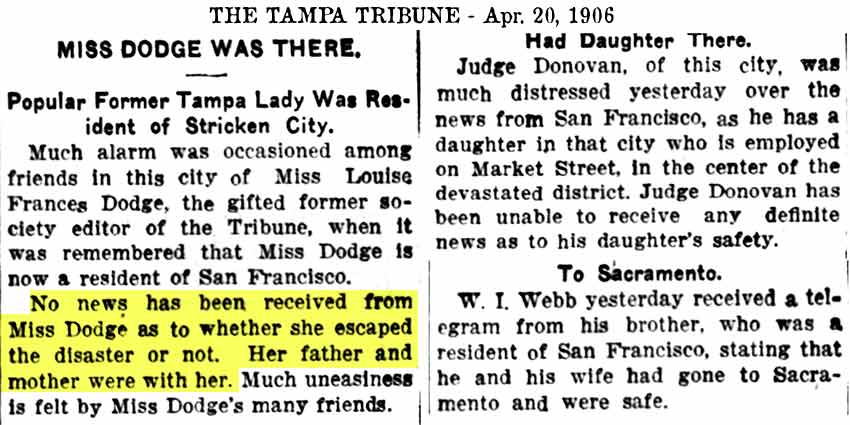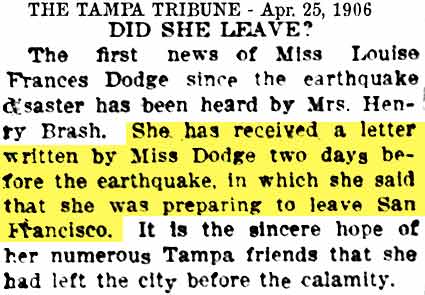|
WHO
WAS LOUISE FRANCES DODGE?
WHATEVER HAPPENED TO HER AFTER THE 1904
MAY FESTIVAL?
Louise
Dodge is mostly remembered in modern times as being a Tampa Tribune
society page columnist and the creator,
planner and coordinator of Tampa's May Festival in 1904 where the Ye
Mystic Krewe of Gasparilla made their first appearance in Tampa. Along with
New Orleans native George W. Hardee, who is credited as the originator
of the idea, she was the driving force of the festival's success
which was greatly enhanced by the Gasparillas appearance in
the floral
parade and the courtly, royal grand finale ball. But she accomplished much more than this
in the four years she was in Tampa.
|
|
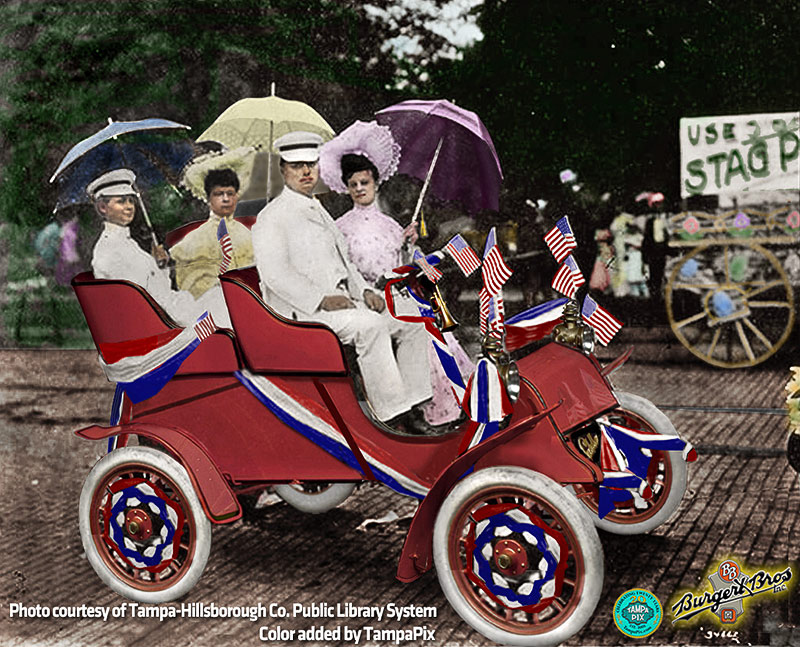 |
| Described as
"First Gasparilla Parade, two couples seated in
decorated 1903 Cadillac" dated May 4, 1904 in
the Burgert Bros. catalog. |
|
MISS
DODGE'S FAMILY TREE
It
is important to start with Miss Dodge's ancestry
because of what is written about her by D.B. McKay
in 1953 in the Tampa Tribune. He claimed she
had a significant cousin.
Louise Dodge was a descendant of American
Revolution general Ebenezer Learned. This connection is through
her paternal grand-mother, Ruth Freeman, through her mother, Dorothy Learned
Hill. Ruth Freeman and David Dodge were the parents of
Louise's father, David Archibald Dodge.
Miss
Dodge was a member of the National Society of the
Daughters of the American Revolution.
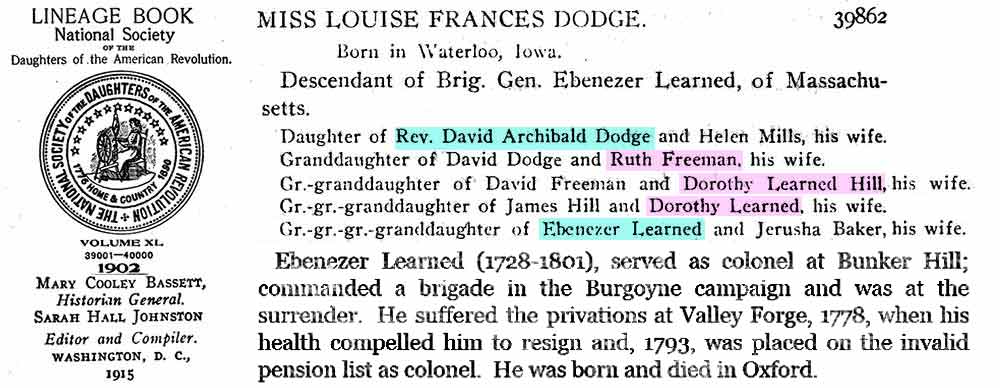
Lineage book by
Daughters of the American Revolution, Publication
date 1902, Publisher Washington, D.C. : The Society
; Harrisburg, Pa. : Harrisburg Pub. Co. Collection,
Contributor Allen County Public Library Genealogy
Center Language English Volume 40 (39001-40000)
available at Internet Archive.
|
|
| For the purpose of clarity, Louise's father
will be referred to as David Archibald Dodge, David A. Dodge
or David Dodge.
His father, (Louise's grandfather) will
be referred to as David Dodge II, because HIS
father (Louise's great-grandfather) was
also named David Dodge, who will be referred to as David Dodge I.
|
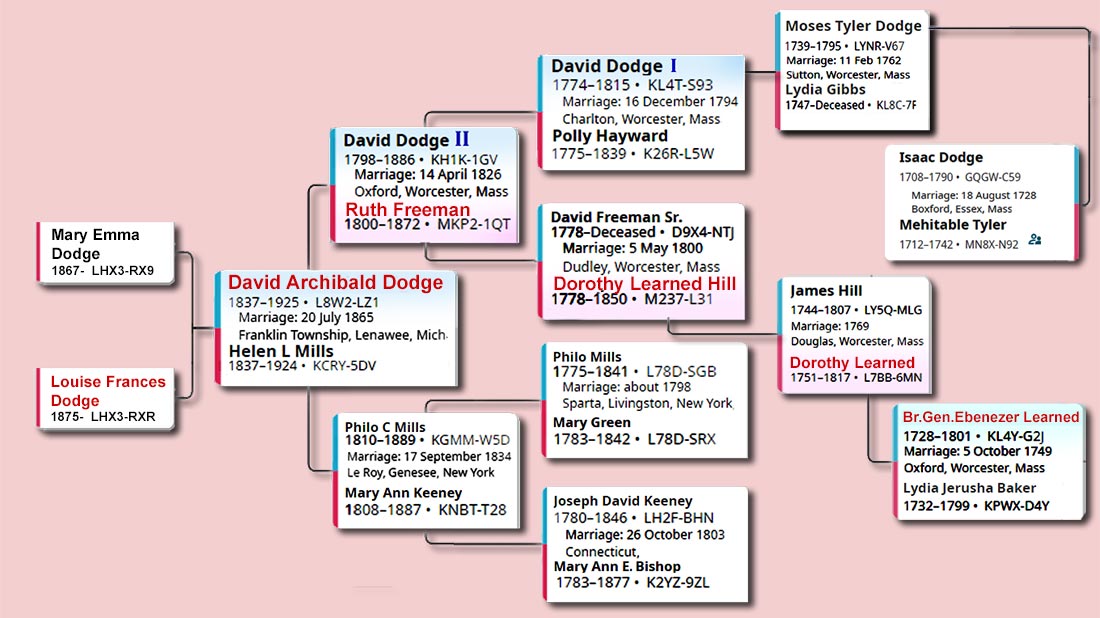
|
HOW THE DODGE FAMILY CAME TO MICHIGAN FROM NEW
YORK
Louise's father, David Archibald Dodge, was born in
Rochester, NYon Feb. 3, 1837.
The
story of how the Dodge family came to Michigan
is told in the obituary of his father
found at Find a Grave.
OBITUARY OF DAVID DODGE II
- LOUISE'S PATERNAL GRANDFATHER
-
Information from Norman Dodge
at Find-a-Grave.
TampaPix has replaced some archaic words and
added some text to clarify the obituary.
Information about David II's wives has been moved
from the end into the chronological context of the
obituary.
|
The Obituary
David Dodge II, whose sickness was of
long standing, died at the residence of his son,
Alex W. Dodge (Alexander De Witt Dodge), in Ionia,
Michigan on Sunday, June 13, 1886,
in the 89th year of his age.* He was born
Dec. 21, 1797, in Herkimer county N.Y., where his father
(David Dodge I) had moved from Massachusetts that same year.
*Interesting to note that
if you interpret "in the 89th year of
his age" to mean he was 89 when he
died, it puts his birth at Dec. 21, 1796,
not 1797.
The calculation being that if he
died at age 89 in June 1886, then he would
have turned 90 on Dec. 21, 1886. Dec. 21, 1886 - 90
=
Dec. 21, 1796.
But the 89th year of one's life really starts when one
turns 88. Consider that the
first year of one's life is
from the time they are born to the day before they turn 1. On
their birthday when they turn 1 they
start their 2nd year..
One's 89th year would be the
one year period after they turn 88. The
calculation, based on being 88 when he
died, means he would have turned 89 on
Dec. 21, 1886. This
interpretation results in a birth date
of Dec. 21, 1797.
In conclusion, if he was 89 when he died then he was born
Dec. 21, 1796. If he was in his 89th year, then he was born Dec.
21, 1797.
It will be assumed he was born Dec. 21, 1797 for the
remainder of this section. |
In the following year
after David II's
birth, when David II was only
six weeks old (early Feb. 1798) , his father David I returned to his native
state of Massachusetts, living on a farm in Worcester county until
David II was 21 years of age (Dec. 1819), at which
time the family moved
to Oxford, Mass.
|
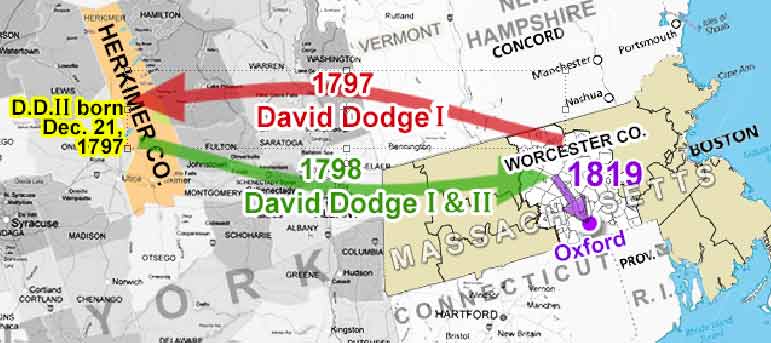
|
David Dodge II first married Lucina Fitts on Aug. 9,
1823 in Worcester, Mass. Their only child,
William Fitts Dodge, was born Aug. 11, 1824,
Lucina died the same day. William Fitts Dodge died in Rochester at
the age of 29 (c.1853).
On April 27, 1826, David Dodge II married
in Oxford, Mass. to Ruth
Freeman, (a daughter of David Freeman Sr. and Dorothy
Hill,) and sister of the late Joseph L. Freeman
and of Mrs. P.C. Hutchins. By Ruth
he had ten children (in Rochester, NY). Ruth died Oct. 2, 1872 in
Ionia, Michigan at age 73. She was born in
Dudley, Mass. on Aug. 15th, 1800.
Read her obituary.
|
Massachusetts, Town Clerk, Vital and Town Records,
Oxford 1626-2001
Marriage of David Dodge (II) and Miss Ruth Freeman,
both of Oxford.
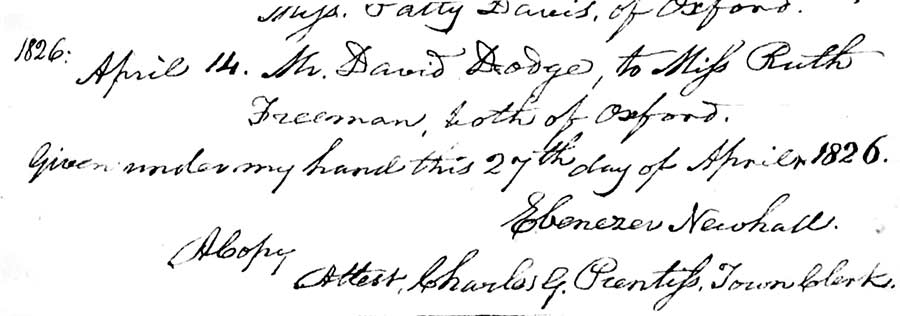
|
|
In 1826
David II and Ruth moved to Rochester,
NY. where they lived until 1843. By Ruth he had ten children.
Eight children were: Nancy Wantie, Elvander W., Alexander De
Witt, Martha, Mary F.,
David Archibald (Louise's
father,) Ruth E., and Sarah Jennie. |
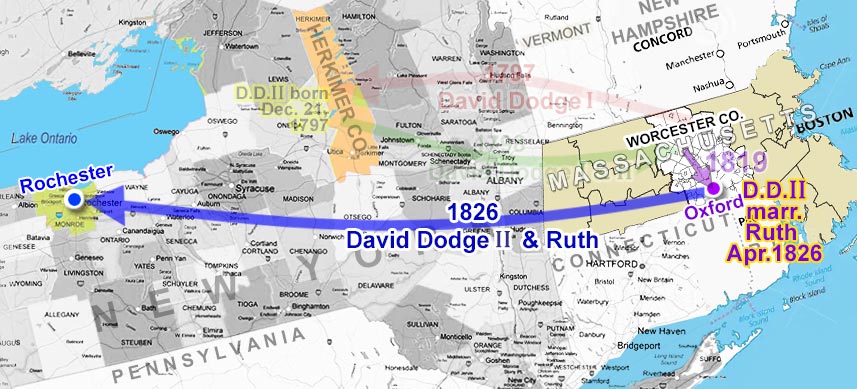
While in Rochester David Dodge II was
a mason and master builder; he constructed three
churches, and the
great flour mill on the Genesee
river. He with his partner excavated the great races
through the solid rock below the first waterfall in the Genesee River. The work was a failure, the parties
projecting it went into bankruptcy and the
contractors lost their pay. (The Genesee flows
generally north from its headwaters in Pennsylvania,
crosses the New York State Canal System, and bisects
Rochester to enter Lake Ontario after a course of
158 miles.)
David Dodge II then closed up
his business and moved to Michigan in 1843.
|
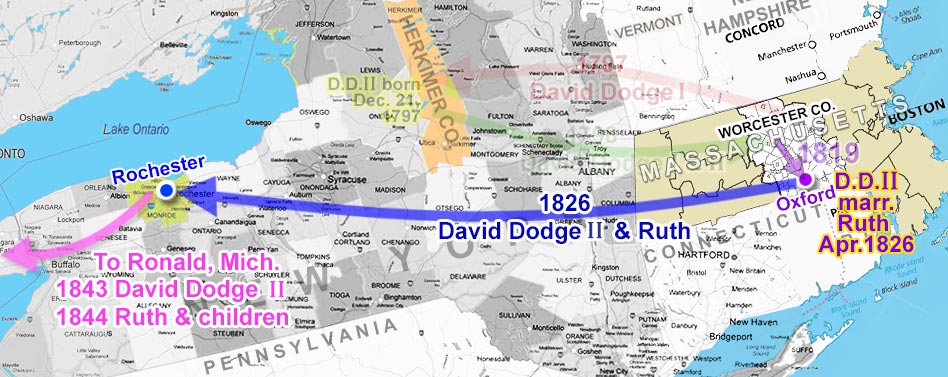
|
1843:
THE DODGES IN MICHIGAN
|
|
In 1843 David Dodge II came to Ionia County,
Mich. and bought a
farm on "Long Plain" in the township of Ronald, and
built a house. In 1844 David moved his family to
their
new home. Several years afterward David Dodge
II exchanged his
Ronald farm for one in North Plains, where he
resided till 1857, at which time he came to Ionia and has
resided here since. |
1873 Michigan maps courtesy of the David
Rumsey Collection.
He
cleared up three new farms in Ionia county. In 1855
his health failed and since 1859* he had lived in the
family of his son, Alexander De Witt Dodge.
|
*The
1860 Census of Ionia village
shows David II and wife Ruth
still living in their own
home. |
|
David Dodge II family 1850 census in
Ronald, Ionia Co, MI
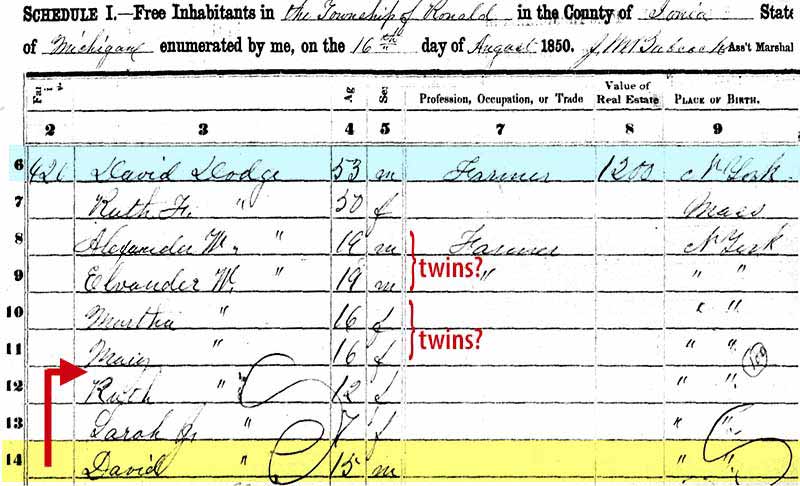
|
This
census shows David Dodge II, age 53 (b. 1796-1797)
born in NY, wife Ruth F, (50) and seven
children from age 19 to 7: Alexander W., Elvander
W., Martha, Mary, Ruth, Sarah J., and David (A.).
David A. is listed out of order which is a mistake,
he should have been listed between Mary & Ruth.
Also, he would have been 13 on the 1850
Census.
The
1860 Census of David Dodge II and wife Ruth in Ionia
shows them still living in their own home with only
a nine year old boy named George Brewster in their home.
It is not known whose child he was, neither David or
Ruth seem to have had a sister who married a
Brewster for him to be a nephew.
 |
The
1870 Census of Ionia village shows David II and wife
Ruth living with their son, Alexander De Witt Dodge,
and his family.
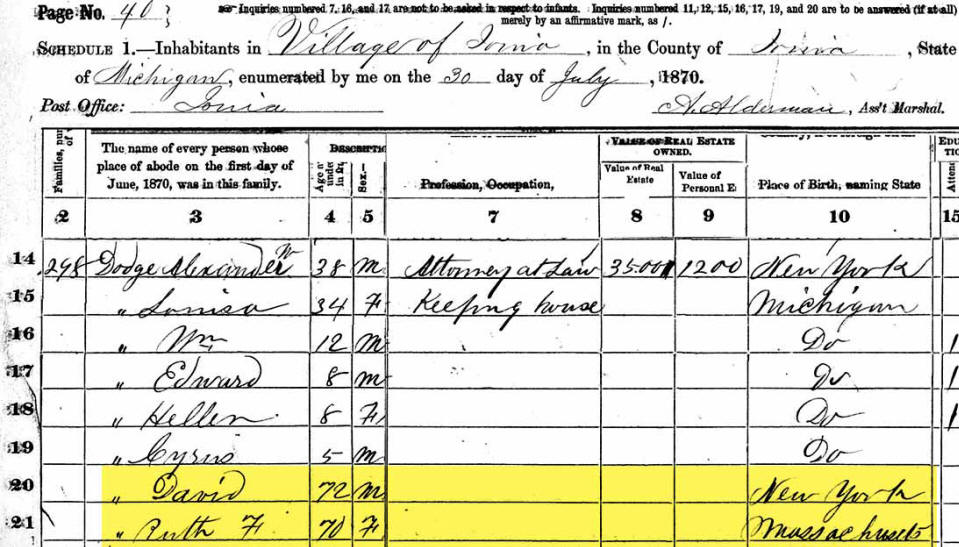
|
Mr.
David Dodge II lived to see born in his family eleven
children (one by his first wife), 45 grandchildren and 9 great
grandchildren, of whom 33 were boys. He was converted to the Christian religion in
1831, under the preaching of Charles G. Finney, at
Rochester, N. Y., and. joined the Presbyterian
church, of which he was a member until the hour of
death. Three sons and four daughters survive him. |
Ruth
Freeman Dodge died Oct. 2, 1872 in Ionia, Mich.
Read her lengthy obit. An excerpt:
|
Having once set out in the Christian life, she
went resolutely forward and did not falter in
the path of duty. She was a Christian in every
relation and wherever she went. In her own
family her Christian character shone forth most
beautifully. She did not leave the religious
education of her children exclusively to the
Sabbath School. She felt that in this particular
she had a duty which no one could discharge in
her place. She faithfully instructed her
children in the Scriptures, and in addition to
this she zealously labored and prayed that they
all might be gathered into the fold of the Good
Sheppard. She lived to see eight of her nine
living children professors of religion and
members of Christian Churches. |
|
1862:
DAVID A. DODGE IN THE CIVIL WAR
David A. Dodge enlisted in the
Union army at Adrian, Mich. on July 16, 1862 and served as
the captain
of Co. I of the 18th Infantry, Michigan. He was
25 years old. He
was discharged on Dec. 1, 1863 having served 1 year, 4
months, 16 days.
|
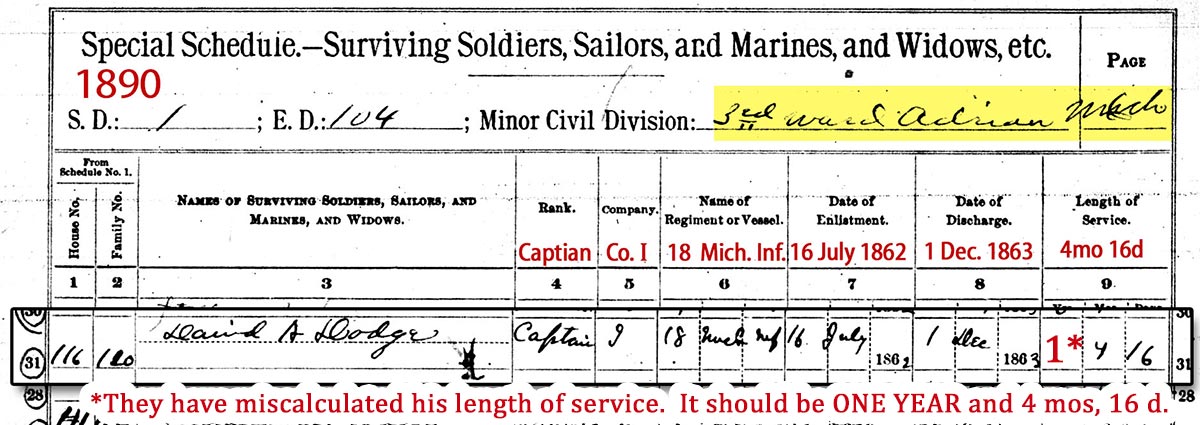
|
The 18th Michigan Infantry in the Civil War
In 1862, after it was clear
that the Civil War wouldn’t be as brief
as both sides had expected, President
Lincoln asked for additional troops.
Michigan Governor Austin Blair requested
that Henry Waldron organize a regiment.
In two months of letter writing,
rallies and person appeals, Waldron
enlisted 1,000 men from Hillsdale,
Lenawee and Monroe counties. The
recruitment of the regiment commenced
July 15,1862, and on Aug. 26th, 1862
was mustered into the service.
On September 4th, 1862, with orders to
report to Cincinnati, they left
Hillsdale with an enrollment of 1,002
officers and men under the command of
Col. Chas. Doolittle.
Charles Camp Doolittle enlisted in
the Union Army shortly after the
Confederates fired on Fort Sumter on
April 12, 1861. He was commissioned a
1st Lieutenant in the 4th Michigan
Regiment and was promoted to colonel
when he became the commander of the
18th.
From Cincinnati, Col. Doolittle
took his regiment to Kentucky, where
they were successful in keeping the
Confederates from plundering cities and
villages. On Nov. 1, 1862, the
Regiment was stationed at Lexington,
KY, and remained at that place until
February 21, 1863. They then marched
towards Danville, Ky, arriving on
Feb. 23, 1863. On the 24th, with the
forces under General Carter, they
retreated to the Kentucky River,
skirmishing with the Confederate forces
of General Pegram during the retreat. On
Feb. 28, 1863, they joined
in the pursuit of General Pegram,
following the southern army as far as
Buck Creek, making a long and rapid
march, partly over rough mountainous
roads. On April 2, 1863, they returned to
Stanford.
The
18th Regiment then proceeded by rail
to Nashville, arriving there on April
14th. On April 17, 1863, they were
ordered to Lebanon, TN. From the
1st. of
November 1863, to the 11th of June,
1864, the 18th. was employed as Provost
Guard at Nashville. TN, where
they did ‘private duty. This official duty was
developed early in the war by Gen.
George McClellan. It was similar to
being the military police. Among their
duties were the “prevention of
straggling,” the “supervision of hotels,
saloons and places of resort and
amusement” and the “suppression of
gambling houses or other establishments
prejudicial to good order and
discipline.”
David was discharged after not more
than 1 month of this duty in Nashville.
The 18th wasn’t involved in any of the
major battles of the Civil War, but that
didn’t keep them safe. Many more
died of disease than of battle wounds.
You can read more about the Michigan
18th Regiment after David's discharge at the websites where the
above info was obtained.
Hillsdale County Historical Society: The
18th Michigan Regiment in the Civil War
Civil War Index - 18th Michigan Infantry
in the American Civil War
|
|
1865:
HISTORIC EVENT: April 15, Pres. Lincoln
dies after being assassinated the previous day at
Ford's Theater.
1865 - July 20:
MARRIAGE OF LOUISE'S PARENTS
On July
20, 1865, David A. Dodge married Michigan native
Helen L. Mills in Lenawee Co, Mich.
She was born Aug. 11, 1837 in Lenawee Co.
This is user-submitted info at familysearch.org,
there is no source provided.
1873 Michigan maps courtesy of the David
Rumsey Collection.
|
|
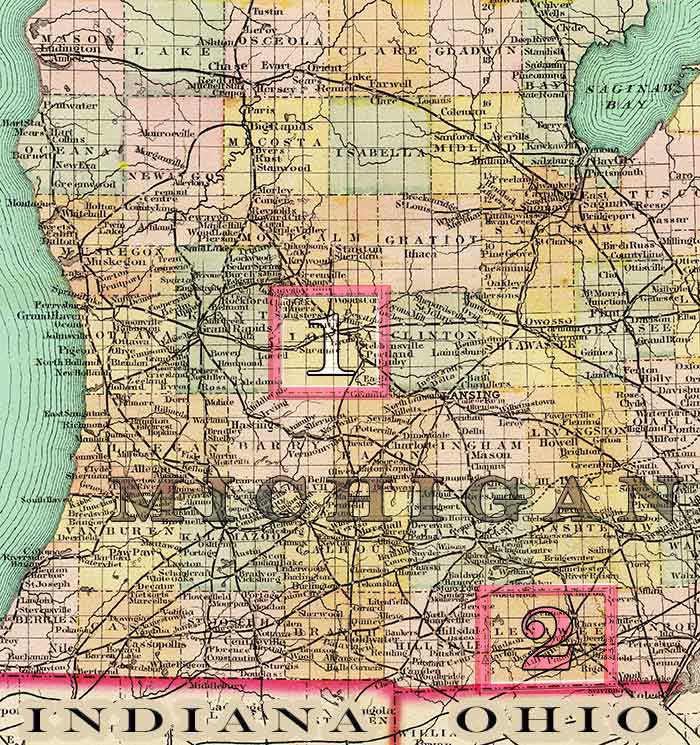 |
#2 at
left
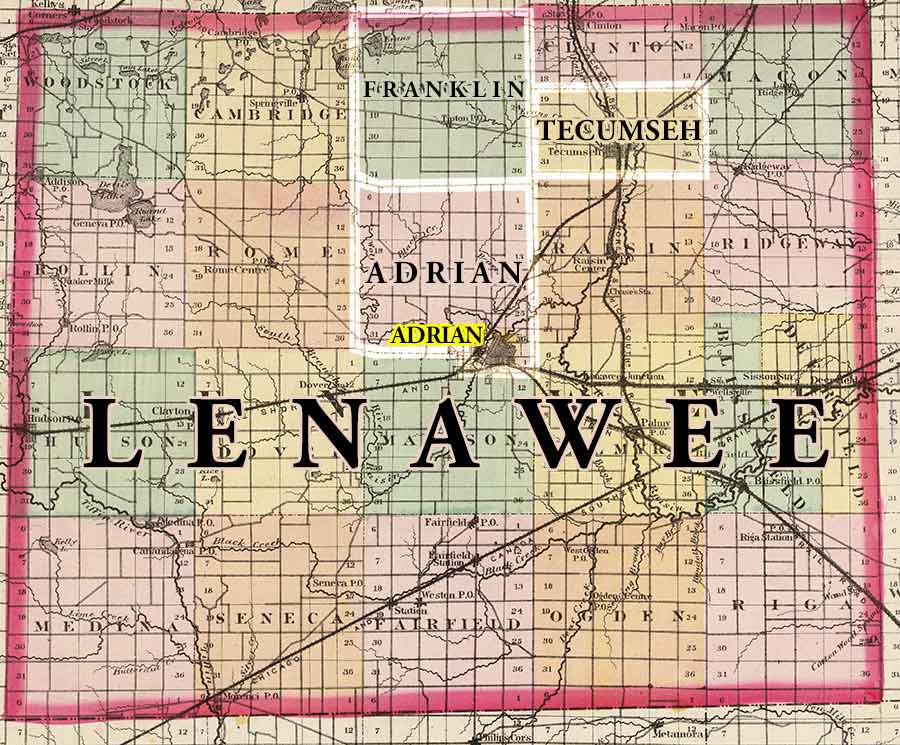 |
|
Helen
Mills was a daughter of Philo C. Mills and Mary Ann Keeney. On the 1860 Census in the
township of Franklin, Helen was a twenty-three year
old community school
teacher. She had three brothers: Adelbert, Francis & Edwin. They are not listed
in correct order.
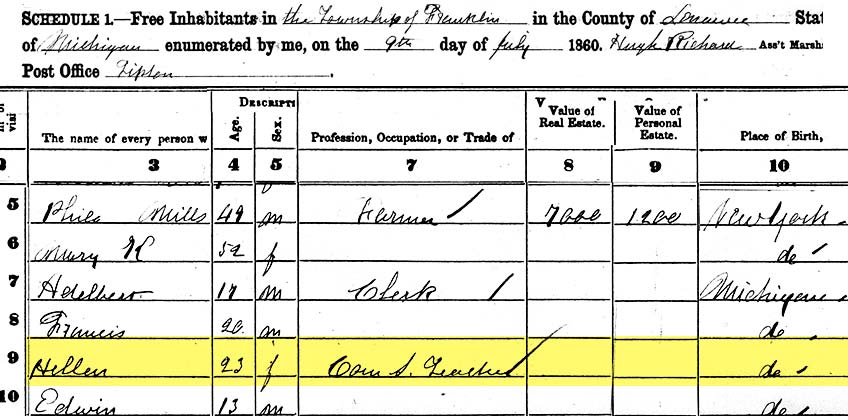 |
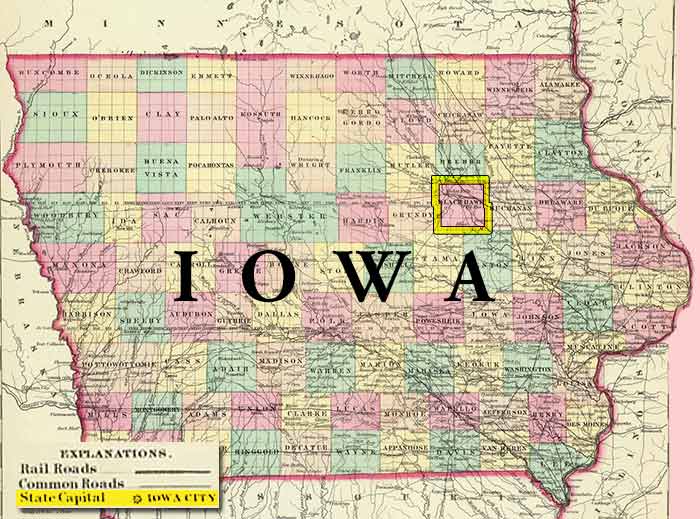 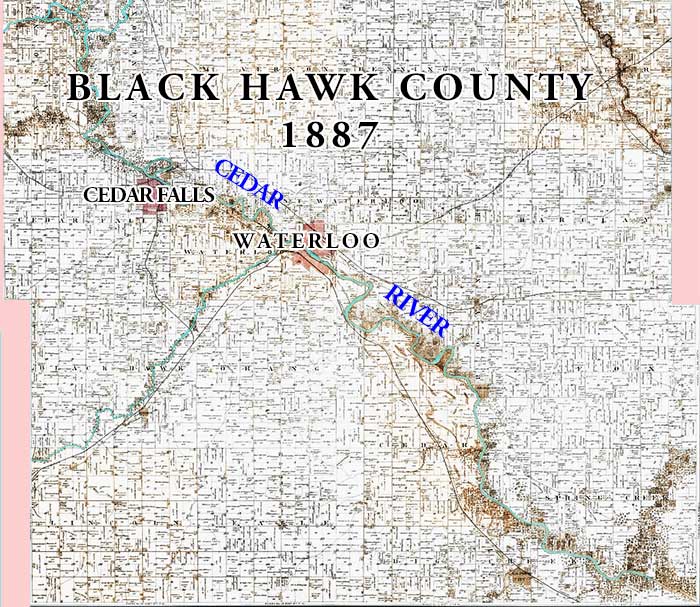
|
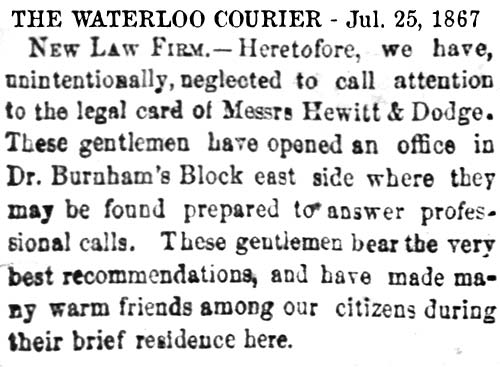 DAVID
A. DODGE JOINS IN LAW PARTNERSHIP, DAVID
A. DODGE JOINS IN LAW PARTNERSHIP,
DAUGHTER EMMA IS BORN
By the
summer of 1867 David A. Dodge and wife Helen had
moved to Waterloo, Iowa where David joined in a law
partnership with A. C. Hewett. (David probably
learned the law from his older brother Alexander who was also
a lawyer back in Michigan.) Their
daughter, Mary Emma, was born in Waterloo on Oct 18, 1867.
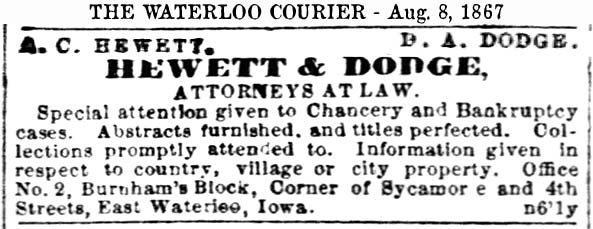 |
|
The
Waterloo Courier was a Republican newspaper for the
predominately Republican county of Black Hawk, Iowa
being a Union State during the Civil War. As
evidenced by several newspaper articles, David
was an active, outspoken member in the
various Republican party and town meetings
during the late 1860s and early 1870s.
1869-May 27: HEWETT
& DODGE IN THE NEWS
In the
May 27, 1869 Waterloo Courier, a letter from a
reader described an incident which happened in
Poyner township, where two "respected citizens"
became involved in a "personal altercation" where
one had stabbed the other. A fight ensued
during which time the victim struck the other, the
knife was bent, but no harm was done. The
knife-wielding assailant was arrested and brought to
trial on May 7th.
"At
the time appointed, the plaintiff appeared by
his attorneys, Hewett & Dodge, and the defendant
by Horace Boies. Witnesses were carefully
examined on the part of the State, and after the
usual sparring and cavorting by the attorneys,
who I must say are good lawyers, the Justice
decided that from the testimony, no cause of
action was proved, and immediately discharged
the prisoner. This ended a most foolish,
and at the same time, almost fatal quarrel, all
growing out of the lack of a little common sense
and reflection."
At
Waterloo's Independence Day celebration of 1869, A.
C. Hewett was the orator of the day, speaking on
"The Characteristics of American Liberty." The
Courier wrote, "...we think Mr. Hewett deserves much
praise for his happy and attractive presentation of
his subject. Few could hold an audience as
well as he did on Monday." That October, Hewett was
admitted to practice in the Supreme Court of the
State of Iowa. Mr. Hewett's full name never
appears in the papers. A Militia Register of
Black Hawk Co, IA of men of military age, Jun 1867
lists A.C. Hewett in the Waterloo Township as age
39. He could not be located on any census.
|
|
1870:
THE DODGE FAMILY 1870 CENSUS, WATERLOO, BLACK HAWK
CO., IOWA
David
A. Dodge was a lawyer (34), wife Helen M. (32) and daughter Mary E. (2).
Mr. Dodge had a modest value of real estate and
property.
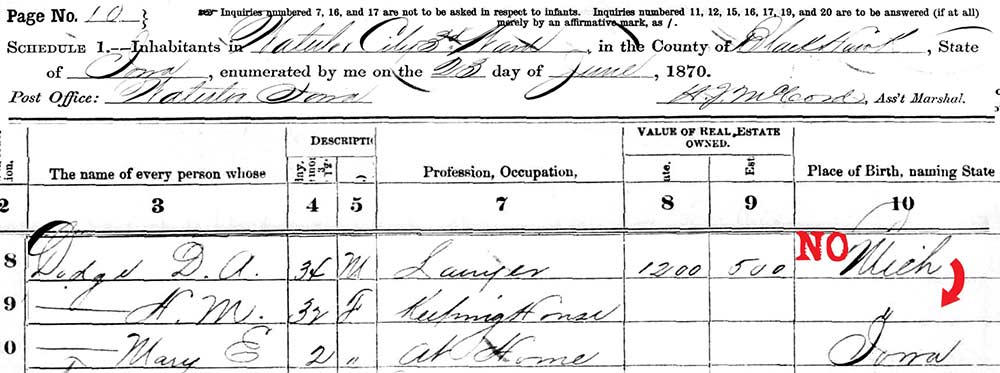
1872-Aug. 29: D. A.
DODGE JOINS A. C. HEWETT AT LIBERAL PARTY CONVENTION
By this
time, David A. Dodge had joined the Liberal Party. The
Waterloo Courier takes the opportunity to belittle
the party's convention.
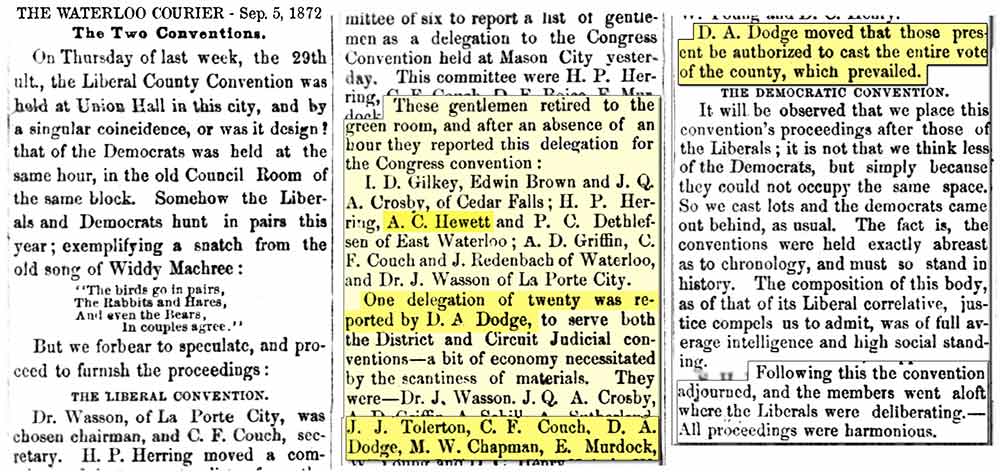
Many
articles were published throughout these years
mentioning the participation of D. A. Dodge at
numerous town and political meetings, mostly of him
putting forth motions to be voted on, but no
administrative or religious position is mentioned
concerning him.
1873-1877
THE DODGES' SOCIAL LIFE
The
Feb. 20, 1873 Courier published the events of the
New England Sociable held on Feb. 14 at Union Hall,
stating the hall was filled as it never was before.
Attendees dressed in various costumes of the New
England colonial period. Already can be seen
the Courier's dim view of Mr. Dodge.
"The old and young present...there were no
long, wrinkled, nor sanctimonious faces
except now and then when the Country Parson,
D. A. Dodge, clasped his hands in solemn
reverence, closed his upturned eyes and
muttered a nasal sky petition."
"Mrs. Dodge often
and aptly declared, 'We're all poor
critters.'"
Mrs.
(Helen) Dodge was also very active in various
aspects of the town affairs:
-
She
was a member of the Congregational Church choir
which gave numerous concerts in Waterloo.
-
She
was a member of the local garden club society
and had a lengthy article printed in the Aug 14,
1873 Courier "A Hint to Orchardists."
-
In
March 1874 the women's temperance movement
reached Waterloo and at a meeting at the
Congregational Church on March 3 which was
attended by about "one hundred of the best women
in the city," she was elected as Vice President
of the society.
-
At
an "enthusiastic and encouraging" Temperance
mass meeting of March 30, 1874, Mrs. Dodge
"favored the meeting with reading a very
touching piece entitled 'How Jamie Came Home.'"
"The article was read in a most beautiful and
touching manner, producing a marked sensation
upon the audience."
-
At
17th Annual Fair of the Blackhawk Co.
Agricultural Society in mid-Sept. 1874, Mrs.
Dodge won the following prizes:
POULTRY, 2nd place best trio light brama
chickens (50 cents.), 1st place best trio white
leghorns (50 cents),
FLOWERS: 2nd place best and most tastefully
arranged vase of art flowers, 50 cents.
PANTRY STORES: 1st place best sample peach
preserves 50c, 1st place best sample pear
preserves 50c,
TEXTILE FABRICS: 1st place best child's
patchwork quilt 50c
-
On
July 12, 1876, Helen wholeheartedly endorsed a
history book of the United States entitled "Our
First Century" written by Judge R. M. Deens
of Massachusetts. The Courier printed rave
reviews by various notable readers which were provided by Mrs.
Dodge.
-
In
late Nov. 1876 Helen was canvassing Cedar Falls to
promote the "fine historical work "Our New [sic]
Century"
1874-Feb.: DAVID A. DODGE PROSECUTES A SUSPECT
CAUGHT TRYING TO PASS FAKE $100 BILL
At a
preliminary hearing before a U.S. Commissioner,
David A. Dodge acted as prosecutor of a suspect who
tried to buy jewelry with a fake $100 bill--THREE
TIMES.
TampaPix first intended to write a summary of the
whole article and present only the greatly shortened
version seen below, but upon reading the whole
article more carefully, found that it was so
cleverly and humorously written, that the entire
article has been provided for your entertainment.
But
first, some outdated/uncommon terminology explained:
-
rather a green hand at shoving the queer -
Inexperienced, a novice at trying to spend
counterfeit money.
-
confederates - Accomplices in an illegal or
unscrupulous plan.
-
murder will out - Bad deeds can't be kept secret
forever or kept from becoming public.
-
it
was scanned again - It was looked at again.
-
"Brick" - This is the name or nickname of a man
who was shown the fake bill and asked his
opinion.
-
darbied - Handcuffed
-
his
satchel was ausgespieldt - The reporter
probably meant "ausgespielt" a German
word with multiple, similar meanings. In
this usage he probably meant that the bag the
suspect carried the goods in had met its use,
its purpose finished, it's purpose had been
played out.
See the whole article here.
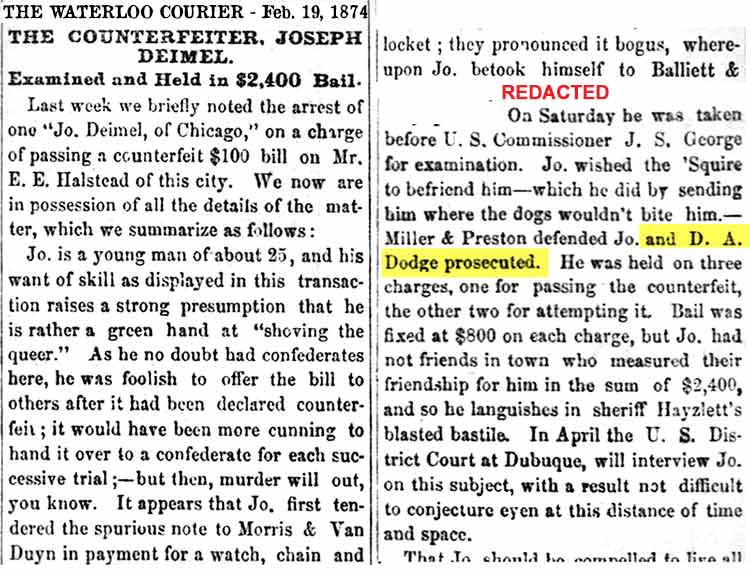
1874-March: HEWETT
& DODGE LAW PARTNERS VANISH
The
last ad for Hewett & Dodge was Mar. 5, 1874.
Their ad never changed over the years. There
was no mention of a dissolving of the partnership
that could be found. The Jan. 5, 1871 Courier
said of Hewett: "During the past two years, Mr.
Hewett has served as a member of the choir in the
Congregational Church in this city, and by his
faithful attendance, extraordinary musical
acquirements and splendid voice, has added
immeasurably to the quality of music of that
Society."
1875-Mar. 22: LOUSE
DODGE IS BORN
Louise
Frances Dodge was born Mar. 22, 1875 at Waterloo,
Iowa. No birth announcement could be found for
her or her older sister, but then, none could be
found for anyone.
1877-July-Oct.:
THE LAST TRACE OF THE DODGES IN WATERLOO
The
last mentions of the Dodges in Waterloo are in 1877.
In the July 11, 1877 Courier
there appeared an article about the
mass Sunday School convention of Lincoln and
Blackhawk townships planned for July 15th "in the
grove at W. P. Thompson." Among the list of
speakers and workers are "Rev. M. M. Taylor, Rev Mr.
Parks of Waterloo, Mr. Dodge, Supts W. P.
Thompson, C.W. Eighmey," etc.
An article on Sep. 26, 1877, indicates that David Dodge had changed his Liberal
Party affiliation
to an Independent party known as the "Greenback
party." David A. Dodge acted as temporary chairman
who "...in spite of his initials doesn't believe in
the 'dollar of our dad..." This is a
reference to the Gold Standard. The members of the
committee put forth three resolutions concerning
interest rates, lending, and the remonitization of
silver so as to reduce the demand on gold which was
draining the gold mines.
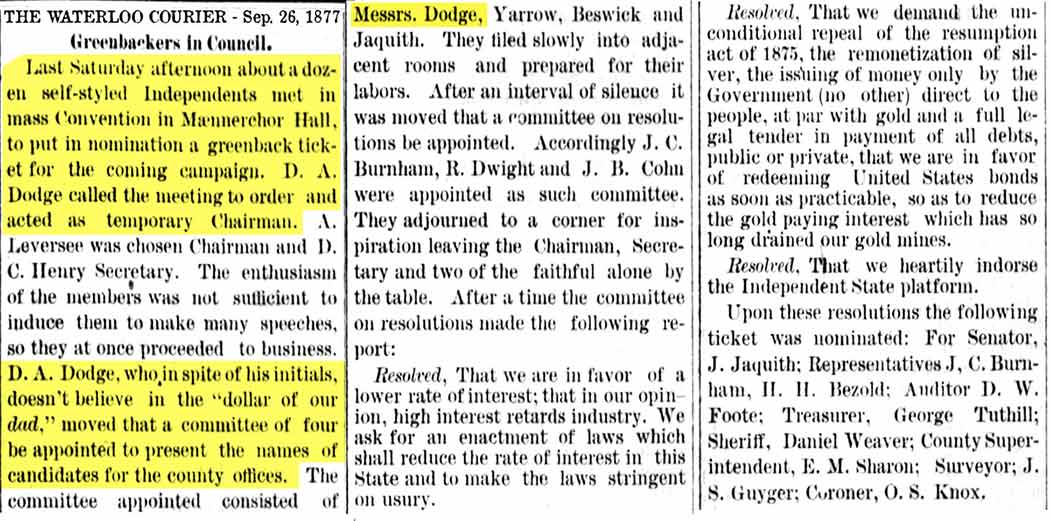
In the
Oct. 3, 1877 Courier, in an article describing the
events of the Sept. 23rd Sunday School assembly, Mr.
Dodge commented on the topic of "How may we increase
the spirituality of the Sabbath School" by stating
"...by being less mechanical, manifesting more tact, by
greater earnestness in prayer and in holding
pray-meeting after the Sabbath School for the
special blessing of God upon the service and the
further conversion of the children, by being more of
a Christian."
1877-Oct 3: DAVID
DODGE DESCRIBED AS "AN ARTFUL DODGER AROUND
POLITICAL HEN ROOSTS"
In the Oct. 3, 1877 Courier, the same issue which featured
the Sunday School article, the Courier attacked D.
A. Dodge for helping Dan Weaver run for county
sheriff by endorsing him as the Independent party
choice.
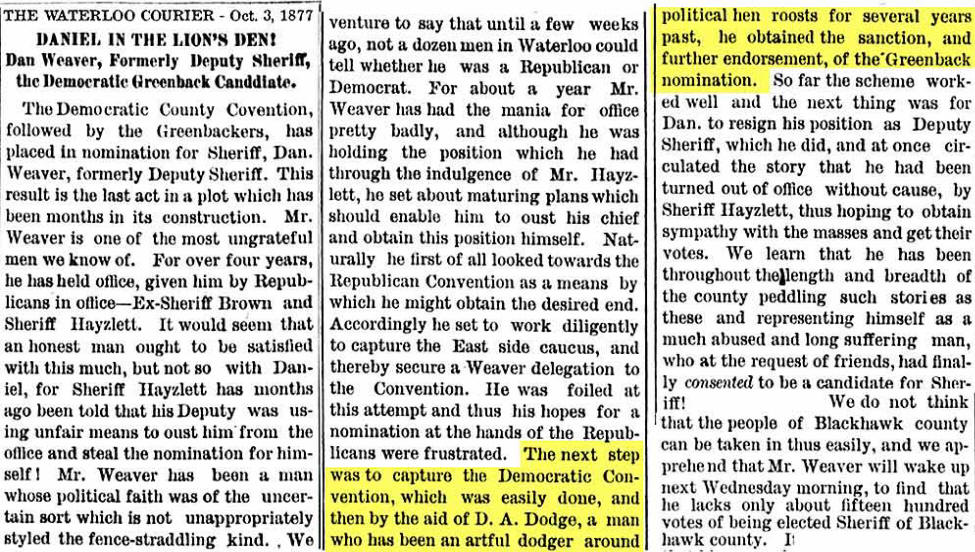
Looks
like the honeymoon in Waterloo was over and it was
time for the Dodges to get out of Dodge.
1880-Apr:
HELEN DODGE VISITS WATERLOO
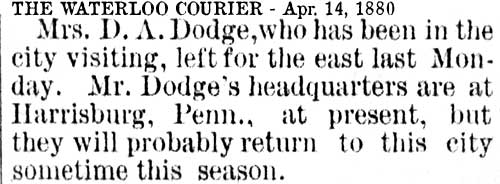 In
April 1880 Mrs. Dodge visited Waterloo. The Courier
reported that she had already left two days earlier
for the East where Mr.
Dodge had his headquarters in Harrisburg, PA.
This was probably the
Greenback party headquarters who held their
Pennsylvania state convention in Harrisburg in late
March, 1880. The party held a national
convention in Chicago in June of that year.
Read about the Greenback Party. In
April 1880 Mrs. Dodge visited Waterloo. The Courier
reported that she had already left two days earlier
for the East where Mr.
Dodge had his headquarters in Harrisburg, PA.
This was probably the
Greenback party headquarters who held their
Pennsylvania state convention in Harrisburg in late
March, 1880. The party held a national
convention in Chicago in June of that year.
Read about the Greenback Party.
1880-June: THE
DODGES ARE BACK IN MICHIGAN
|


|
By June 1880, David, his wife Helen, and daughters Mary
Emma and Louise moved to
Tecumseh, Lenawee Co., Michigan where they are on found the 1880
Census. David A. Dodge, age 44, was a
"book agent." In his home was his wife, Helen
M. (42), daughter Mary E. (12), and daughter Louise
F. (5).
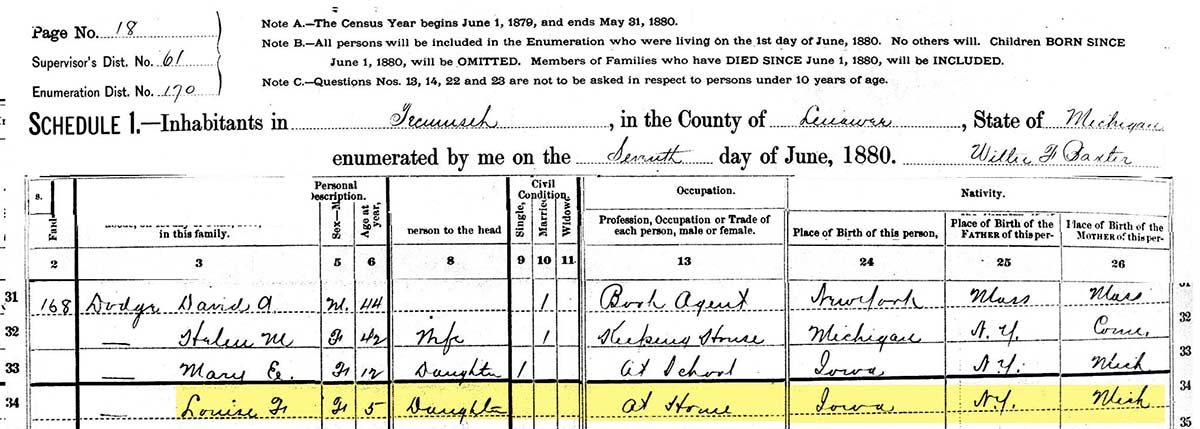
Mary
"Mamie"
Emma Dodge died of peritonitis on Mar. 13, 1884 in Lenawee Co, Mich.
She was buried in Oakwood Cemetery in Adrian.
She was nearly sixteen and a half years old.
|

|
1893-June 21:
LOUISE DODGE GRADUATES FROM ADRIAN HIGH SCHOOL,
PARTICIPATES IN GRAD'S CLASS DAY
Louise
was one of twenty-three graduates of Adrian High
School. She participated in the activities of
the day with a presentation of the class history.
Louise would have been eighteen years old.
|
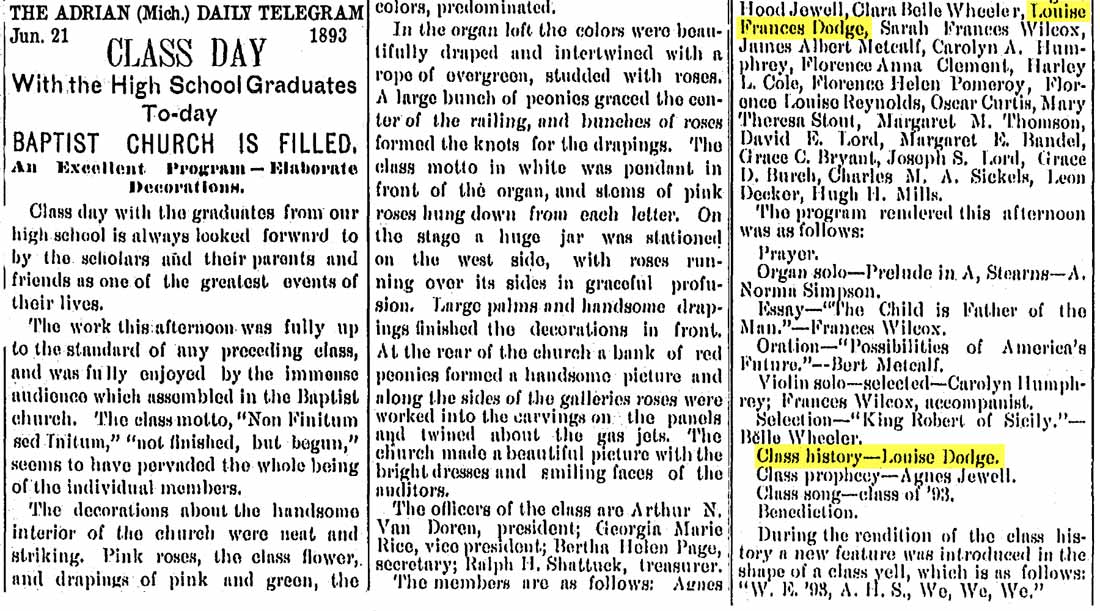
The
next month, July 1893, Louise's father filed for a
Civil War pension as
an invalid.
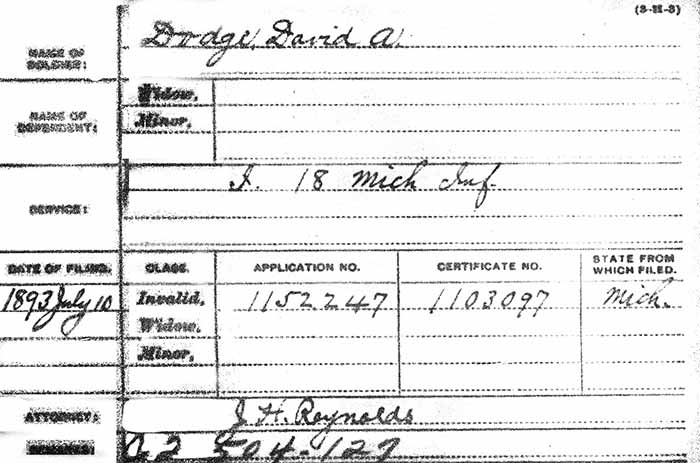
|
1893:
THE DODGES MOVE TO HESPERIA, MICHIGAN
In 1893,
after Louise's high school graduation,
the Dodges moved from Adrian to Hesperia where David
Dodge was a pastor with the Presbyterian church.
This is about 145 miles northwest of Tecumseh.
|
|
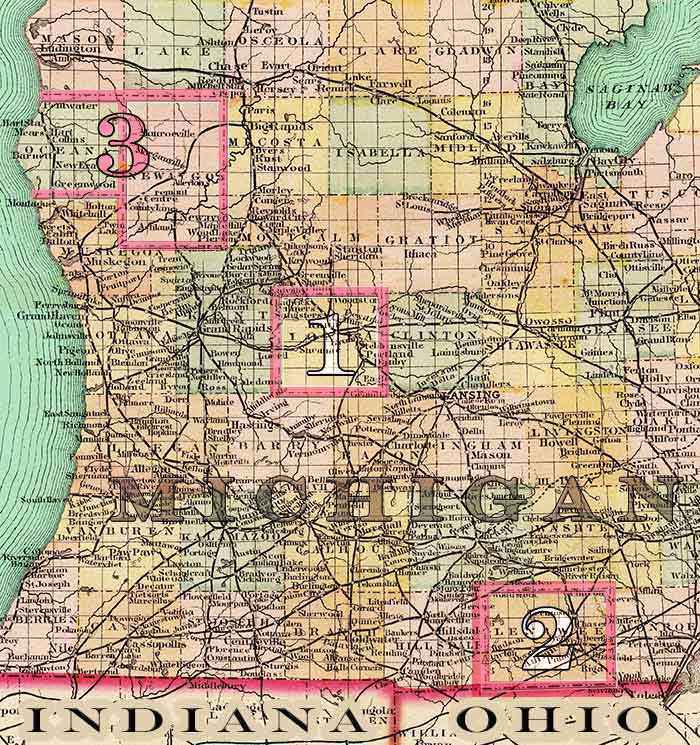 |
Area #3 at left.
The town of Hesperia is situated on the
border of two counties; Oceana and
Newaygo.
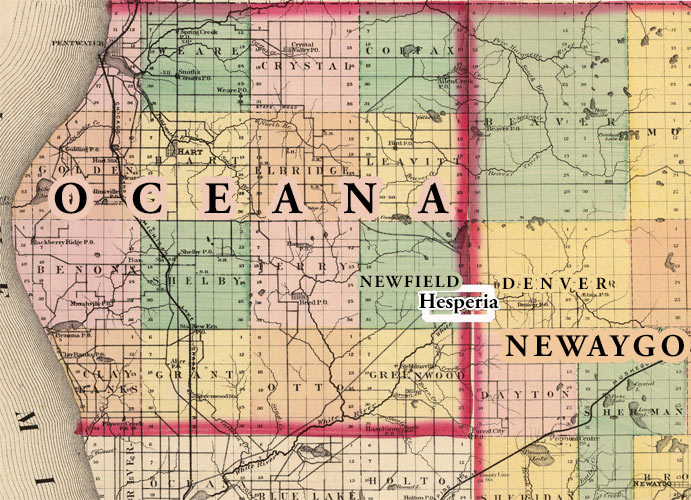 |
|
1895:
LOUISE FRANCES DODGE ENROLLS AT THE UNIVERSITY OF
MICHIGAN
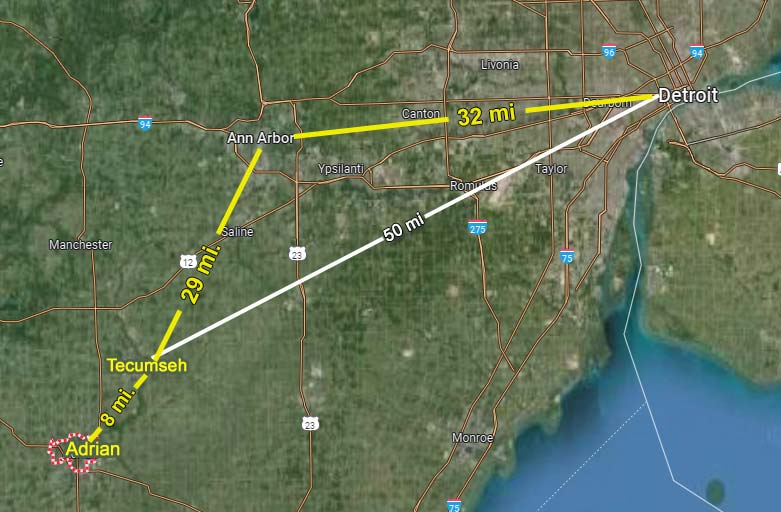
It is not known if Louise stayed behind when her
parents moved to Hesperia in Newaygo Co. She
was 18 at that time.
Louise lived in Adrian while she attended the University of Michigan at Ann
Arbor from 1895 to 1896 in pursuit of a Bachelor of
Philosophy degree.
In 1897 she left UM before
obtaining her degree and enrolled in the State
Normal College at the University of Nashville (a
Peabody-funded school) from 1897 to 1898. It's
not known what degree she obtained there, but this
school was primarily one of educating students to become
teachers. (Recall that her mother was a school
teacher.) After graduating, she returned to
the University of Michigan for two more years from
1899-1900.
|
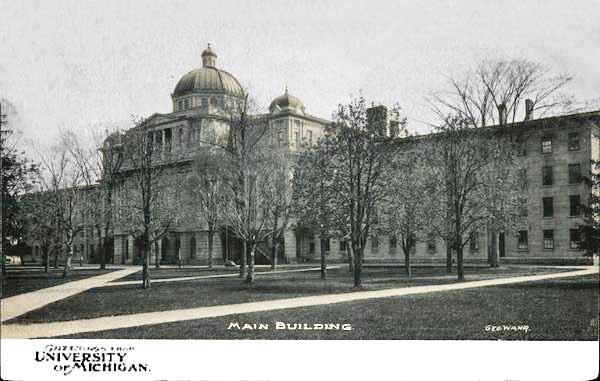
University of Michigan
Main Building ca. 1900.
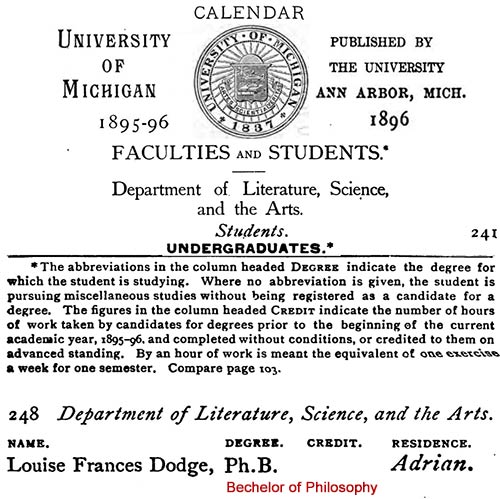
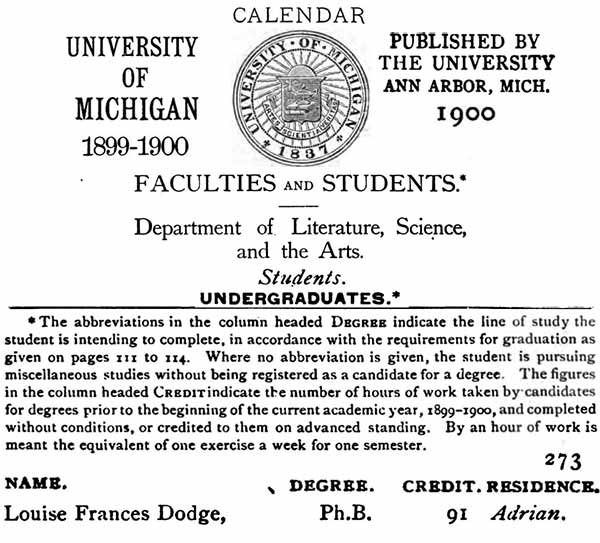
|
1900:
THE DODGES IN FLORIDA
In late
1899 to early 1900 David A. and Helen Dodge moved to Auburndale, Polk County, Fla.
David A. Dodge continued his Presbyterian ministry
and Helen was active in church matters. By
June they had settled in Winter Haven.
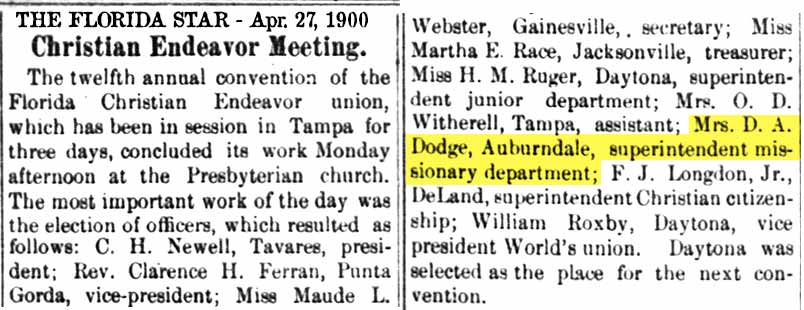
Their 1900 Census in Polk County
shows David A. Dodge b. Feb 1837, Presbyterian
Minister, and Helen M.
Dodge b. Aug. 1837. She was the mother of two children, with one
living at the time.
1900 Census, Winter Haven, Polk Co.,
Fla.
 |
After
the census, Louise
joined her parents in late 1900 without having obtained a Ph.B. from U of M.
Her parents were active in the Presbyterian church
in Tampa, Winter Haven and Kissimmee where he was a pastor.
They made frequent trips to Tampa to visit friends
and participate in various church activities.
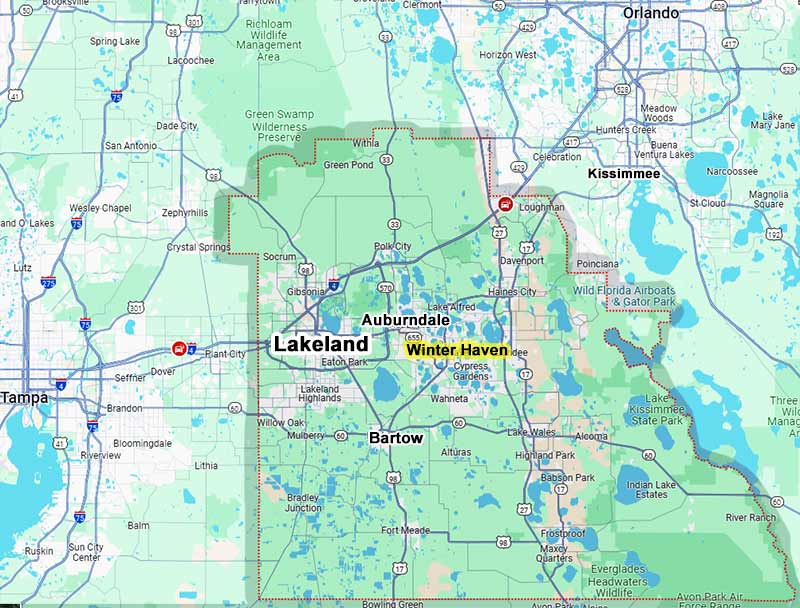
Tampa is about 45 miles from Winter Haven.
1901-July 13:
LOUISE DODGE IS HIRED BY THE TAMPA TRIBUNE
While
living in Winter Haven, Louise was a popular
correspondent for Polk County's Bartow Courier-Informant as the writer
of "upbuilding letters" which were regularly published using the name of "Johnny."
In July
1901, Louise was hired by the Tampa Tribune, at
which time she became the society page columnist.
|
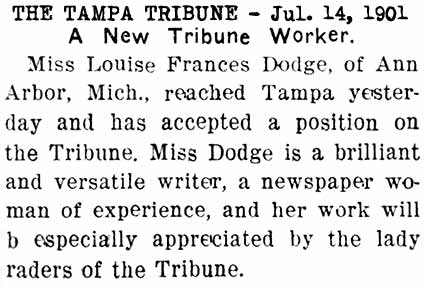
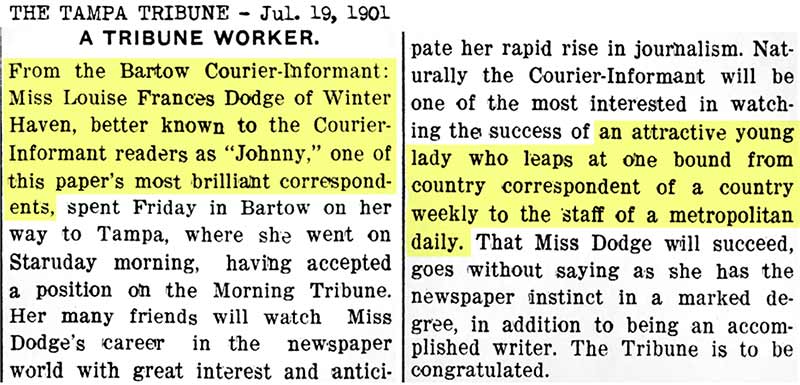
|
Miss Dodge's first column appeared
in the Sunday, July 21, 1901 Tampa Tribune.
Her middle name is misspelled "FRANCIS," the
male spelling.
The first part, shown below, was about a summer
dance at Ballast Point; who was there, what
they wore, and who provided the music. She referred to people of Tampa as "Tampaites," a
term the Tribune used frequently during this period.
They had A LOT to learn about Tampa, and it's people,
TAMPANS.
This was a small part of the article.
The rest, not presented here, was dozens of short,
one or two-line paragraphs of the comings, goings,
and doings of Tampa's socialite elite in and out of
Tampa.
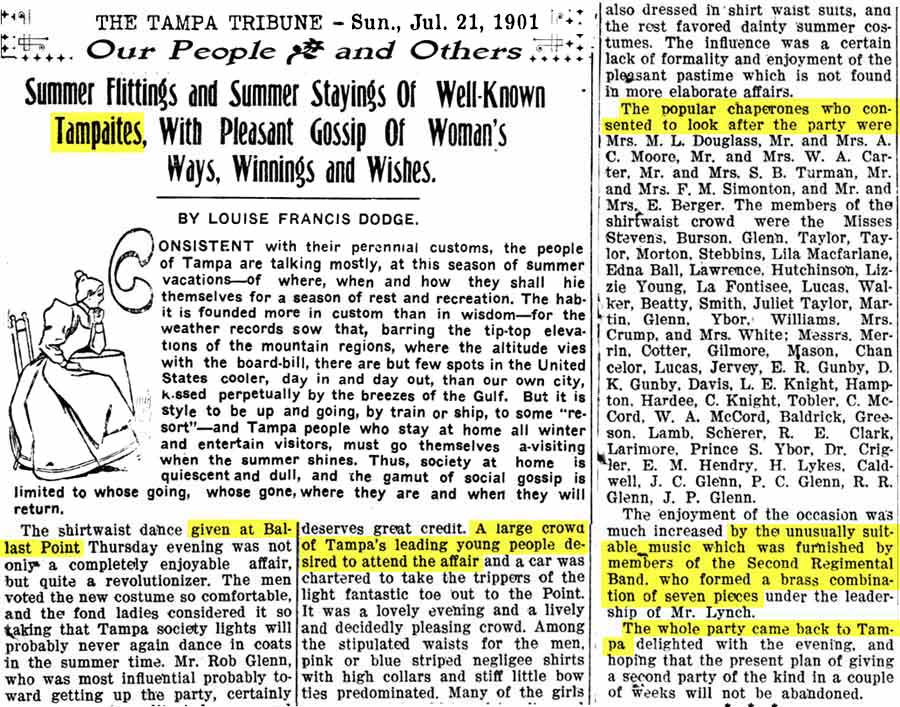
On July 26, 1901,
Miss Dodge circulated a petition which raised $30.50
so Tampa's Second Regimental Band could take part in
an excursion to Manatee.
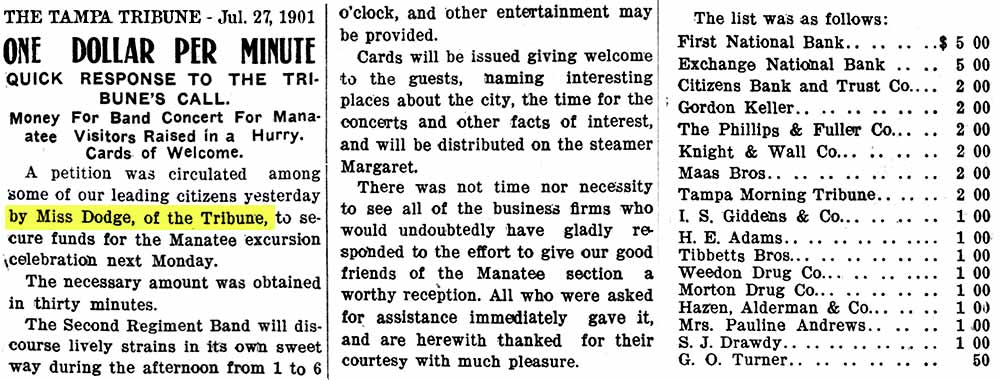 |
|
Tribune department "Our People & Others"
feature in Sunday Tribunes was drawing
approving comments. |
Louise Dodge was described as Lambright's
assistant by the unheard-of-until-now
"Tampa Advance News." How did they
know how many pages the next Tribune was
going to be?? |
|
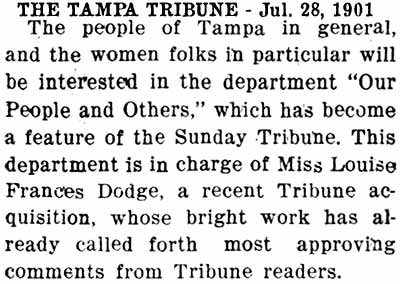 |
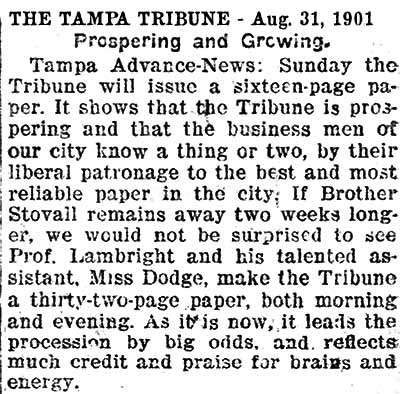 |
Louise's parents were known for frequent
entertainments in their Winter Haven home.
The "Fatherland" is a reference to Germany.
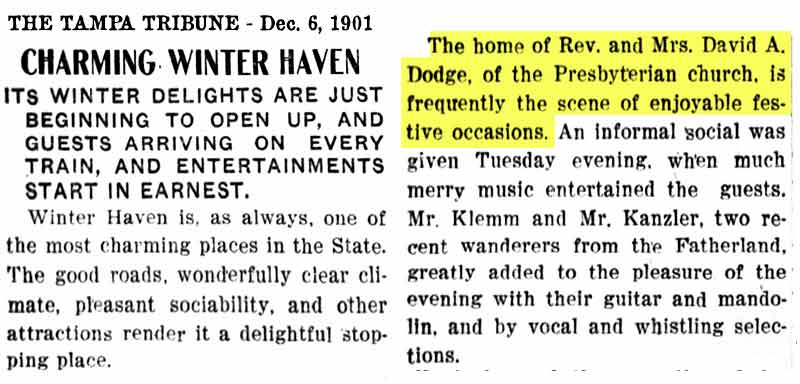
Miss
Dodge's column quickly gained popularity and
publicity in other newspapers.
|

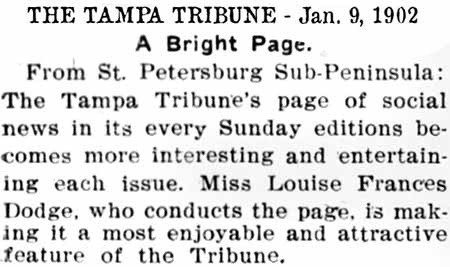 |
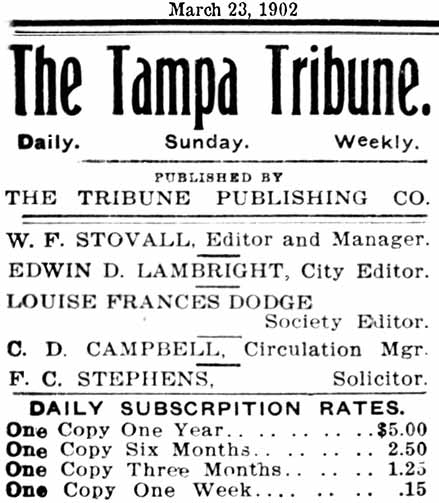
On Mar. 23, 1902, Louise got her name up
in lights along with the big dogs.
Notice the "SUBSCRPITION" [sic] rates. |
|
1902-April 6:
THE
TRIBUNE ANNOUNCES A NEW DEPARTMENT
In
their Apr. 6, 1902 issue, the Tribune announced a
new feature (the name not mentioned) by Miss Dodge which would be published
on Tuesdays through Saturdays. (The Tribune did
not publish on Mondays.) It would "reflect,
accurately and interestingly, the social and home
life of Tampa with glimpses of that in other
places." News of church, education, music,
social organizations, schools, the passing throng,
private entertainments, what people are doing for
the city and what they want to do." Her
Sunday feature, "Our People and Others" would
continue and be a summary of events of the week and
announcements for the coming week.
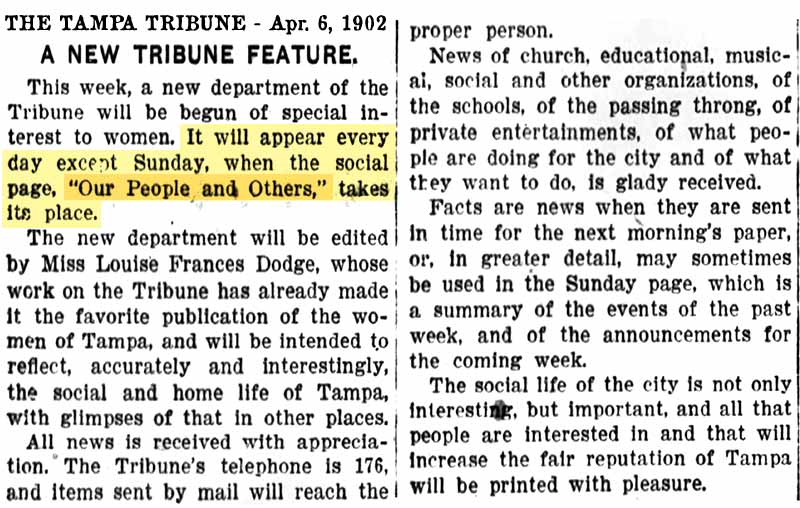
In the
next two years of Louise's new feature, it was
rarely published every day, Mon thru Sat.
It usually appeared two to four times during the
week.
1902-April 8:
LOUISE DODGE'S NEW SOCIETY PAGE FEATURE IS TITLED
"WOMAN'S WAYS AND WISHES"
Nobody
seemed to notice, or care, that
"Woman," one adult female
person, was used in the singular possessive form "Woman's"
instead of "A Woman's Ways" or the
plural possessive "Women's Ways."
"It
will aim to reflect more and more the multiform
activities that occupy the time of womankind in
Tampa, and to express more and more the wishes that
the women have for Tampa." The
introduction of the new feature seen below has been
shortened.
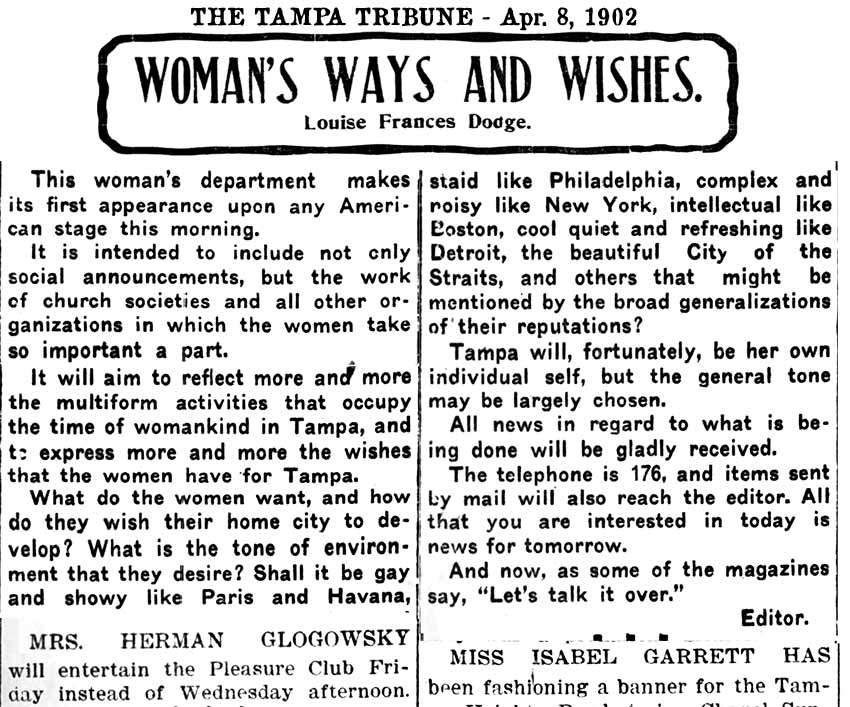
1902-July: MISS
DODGE ORGANIZES AN ART CLUB
Although none of the articles below state that Louise
first suggested the idea or initiated it,
later sources attribute the club's formation
to her. Probably not wanting to appear to
credit herself in her own feature, she credits "a
number of ladies."
|
|
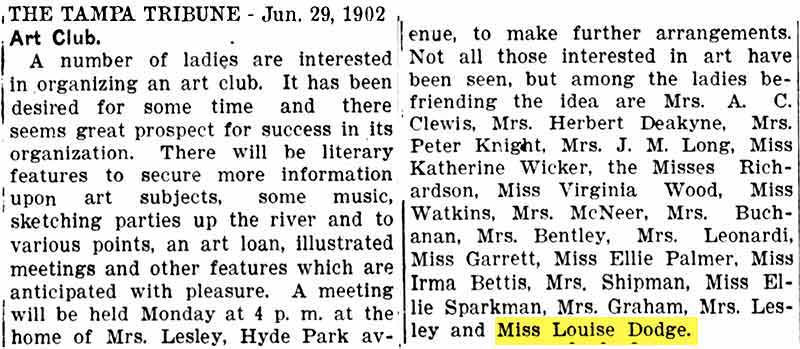 |
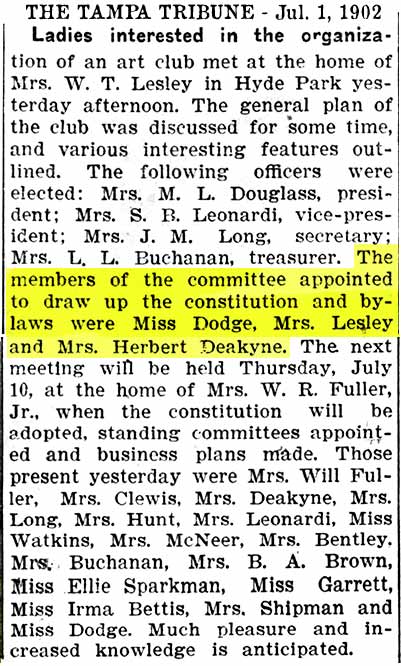 |
|
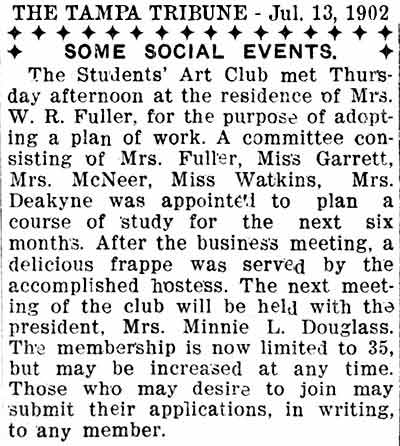 FIRST
MEETING OF THE STUDENTS ART CLUB FIRST
MEETING OF THE STUDENTS ART CLUB
The club's first meeting was spent
forming a plan of work for course study.
A committee was formed for this purpose,
after which a frappe was served by Mrs.
Fuller.
The next meeting was planned to be held
at the club president's home.
Membership was limited to 35. |
|
|
MISS DODGE RETURNS FROM SUMMER VACATION
According to this article, Louise Dodge was on
vacation during the time the Students Art Club was
being organized. Her "return to the city" was
just that. Why not "to her home in the the
city" or "to her home in Tampa?" This is an
indication that she didn't live in Tampa.
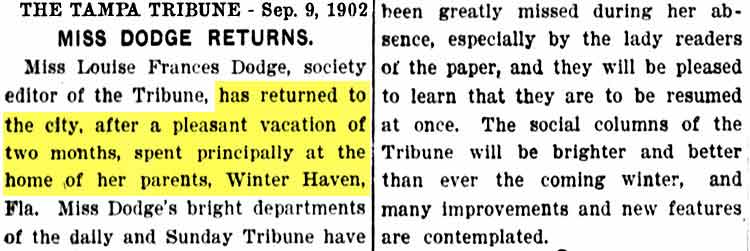
|
|
ART CLUB STUDIES BARNARD
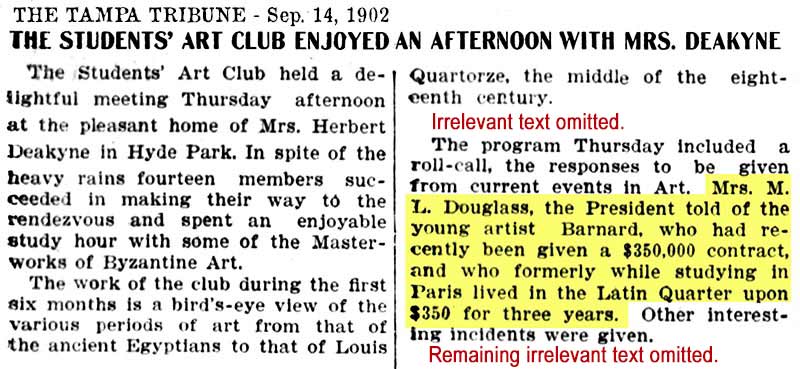 On Sep. 11, 1902, the Students' Art Club
met at home of Mrs. Deakyne. The club
president told of the "young artist
Barnard" having recently been
commissioned with a $350,000 contract.
She contrasted the amount with how much
Barnard lived on while he was studying
in Paris--"$350 for three years."
The
mention of a $350,000
contract recently given to Barnard was
about Barnard's commission to create the
sculptures for the Pennsylvania State
Capitol. There was no mention of a
memorial sculpture to H.B. Plant having
been installed at the Tampa Bay Hotel
just six months earlier in March 1902.
Why? On Sep. 11, 1902, the Students' Art Club
met at home of Mrs. Deakyne. The club
president told of the "young artist
Barnard" having recently been
commissioned with a $350,000 contract.
She contrasted the amount with how much
Barnard lived on while he was studying
in Paris--"$350 for three years."
The
mention of a $350,000
contract recently given to Barnard was
about Barnard's commission to create the
sculptures for the Pennsylvania State
Capitol. There was no mention of a
memorial sculpture to H.B. Plant having
been installed at the Tampa Bay Hotel
just six months earlier in March 1902.
Why?
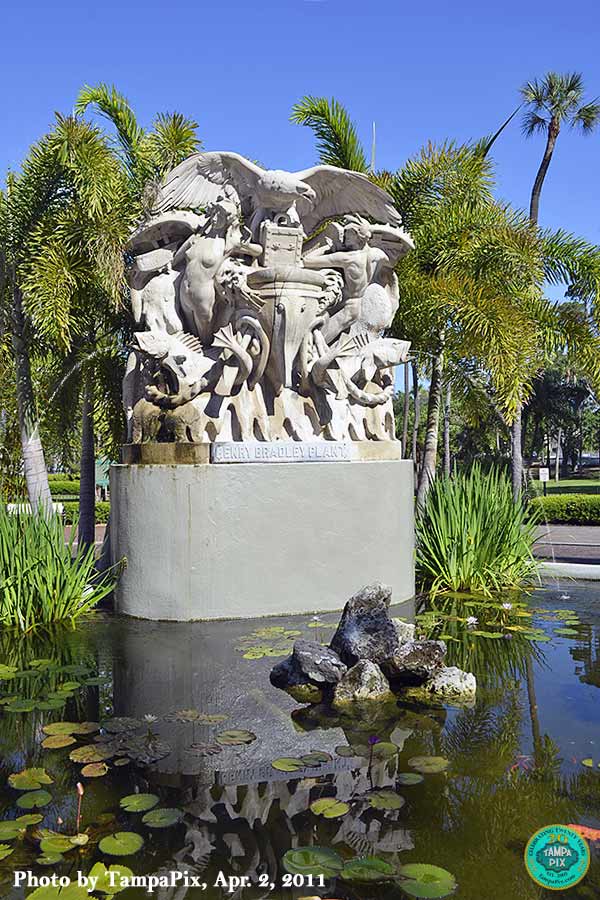
"TRANSPORTATION"
George Barnard is credited with creating
the sculpture "Transportation,"
a memorial for H. B. Plant reportedly
commissioned by his widow, which stands
today in a fountain pool between the
University of Tampa and Plant Park.
Yet, from the time of Plant's death in
June 1899 up to the time it was installed in
March 1902, there was
no publicity about it ANYWHERE, only a
one-sentence paragraph in the March 28,
1902 Tribune which gave credit to a different
artist for its carving and installation.
A search on the web will find many
websites that mention the sculpture all
repeating the same unsourced information
with nefarious claims of it being carved
by Barnard and installed in 1900.
See the TampaPix feature about this
sculpture for the facts. |
|
ART CLUB AND ART MUSEUM COMBINE IN 1923
In 1923
the Tampa Art Institute was formed when
the Students Art Club and the Tampa
Museum of Fine Arts were combined.
It's not until 1930 when we read in the
Tribune that the art club was organized
by Mrs. C. C. Martin and Miss Louise
Dodge.
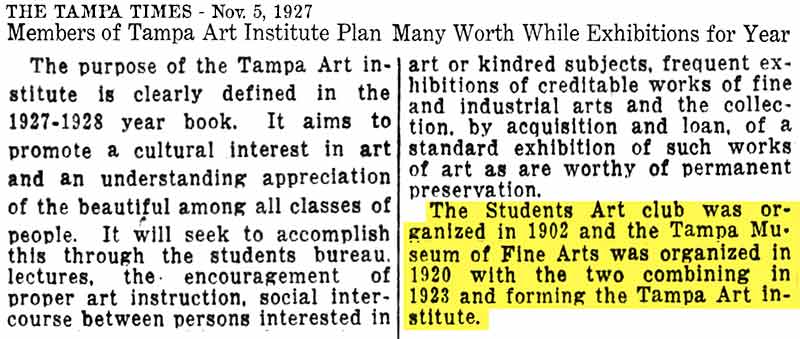
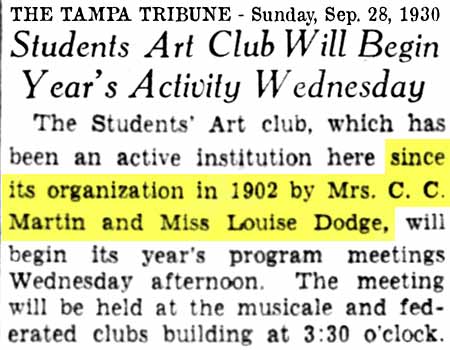
|
|
1902-Oct./Nov.: LOUISE DODGE AND MRS. W. H. FERRIS START A MUSIC APPRECIATION CLUB
THE
FRIDAY MORNING MUSICALE
Miss
Dodge is credited (though not mentioned in the
early articles) to have suggested and co-created
with Mrs. William H. Ferris, Tampa's "Friday Morning Musicale," a
women's socialite club which met on Friday mornings
to promote their knowledge and enjoyment of music, and of
course, to socialize. In the
beginning, meetings were held in one of the member's
homes, but as membership grew, other facilities were
often used.
The
interest in starting the club was announced in Miss
Dodge's "Woman's Ways & Wishes" on Oct. 3, 1902
with a description of its purpose in the first
paragraph. It was
organized on Oct. 31 at the home of Mrs. W. H. Ferris
who was
chosen as the club president. Miss Dodge was
chosen as the club's secretary. The club
organized with sixteen charter members and the
membership was limited to twenty-five.
The
usual format led off with a roll call during which
each member present would respond with a comment
about the topic of the week. A member would
then give a presentation on the subject, usually a
composer, musician or vocal artist. Sometimes
the topic was a particular genre, era or style of
music. This would be followed by a discussion
and a handful of selections of the featured music
pieces played on a piano or violin, or sung by
members. A discussion of other music news and
planning the next meeting followed.
|
|
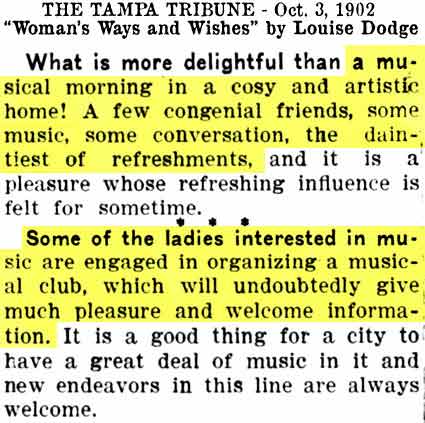 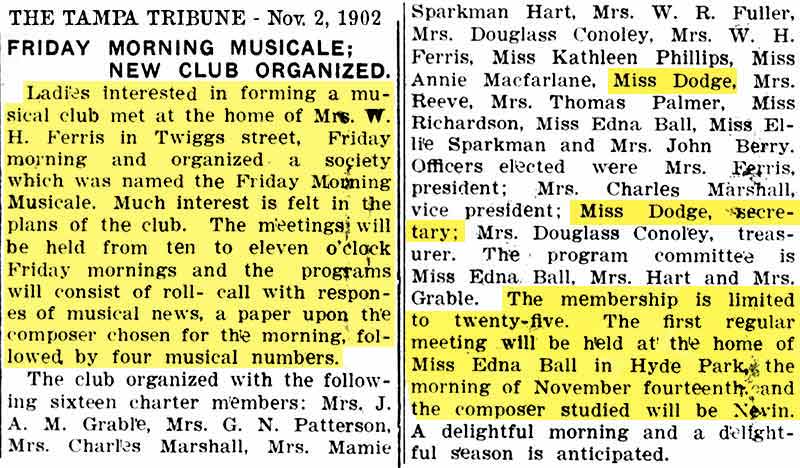
|
The new club was reported as being
organized "at the home of Mrs. W.H.
Ferris in Twiggs St. " The 1900
Census in Tampa shows William, his wife
Katherine, and daughter Katherine.
enumerated incorrectly as "Hanford" and
living in the household of Florence
Hanford, William's mother, on Twiggs
St.. William was in the shoe
business, Mrs. Ferris was a music
teacher. |
|
 |
|
FIRST REGULAR MEETING OF THE FRIDAY
MORNING MUSICALE
|
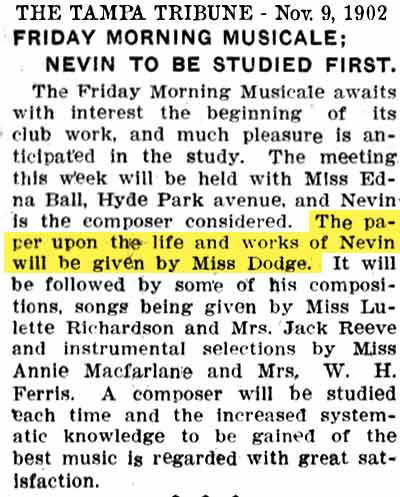
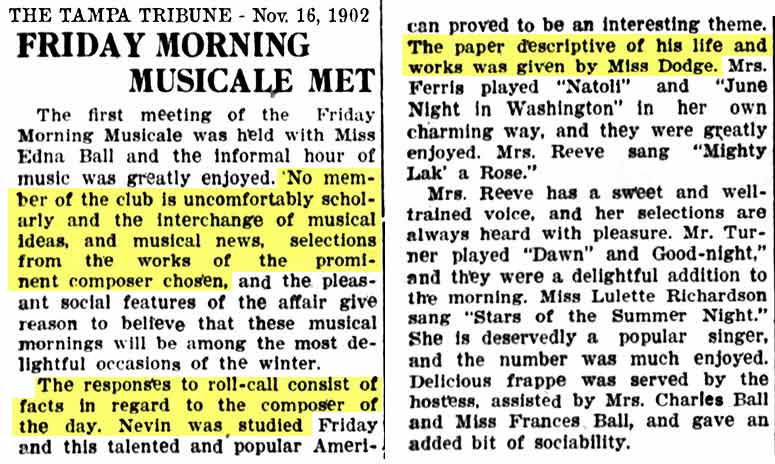
|
THE
TRIBUNE LOSES THE APOSTROPHE |
|
|
The Oct. 31, 1902 Tribune was the last
to use the singular possessive form of
"Woman" for Miss Dodge's
feature.
Was it possible they thought all
along that this was plural? |
The next day, the apostrophe was
removed, now leaving readers to wonder
if the Tribune knew that the plural
of "WOMAN" is "WOMEN"
and their ways would be "Women's Ways." This spelling continued until Louise
left the Tribune. |
|
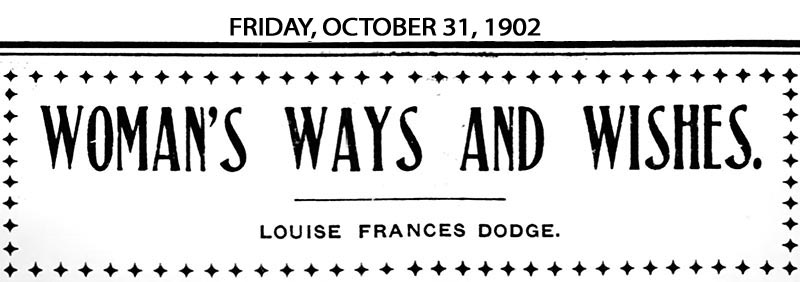 |
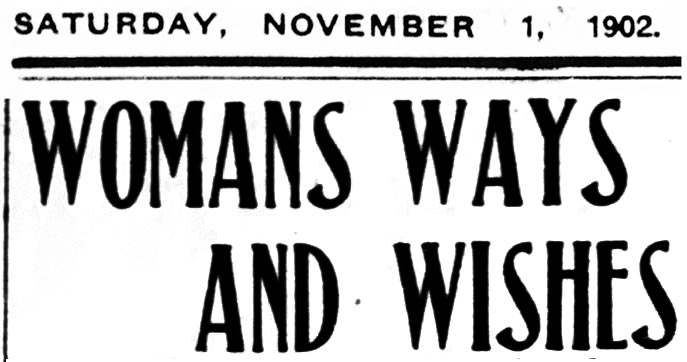 |
HISTORY OF THE FRIDAY MORNING MUSICALE PUBLISHED IN
1917
On Dec.
16, 1917, the Tribune published a history of the
club up to that point, written by the current club's
president, Mrs Grable.
This article has been shortened to 1911 history; the
article
covered up to 1917. It is the first to publicly give
credit to Miss Dodge as one of the two originators
of the club. Mrs. Ferris, the other
originator, was the club's first president and
Louise was the secretary.
The original
membership was limited to twenty-five, but in late
1903 was increased to thirty-five and in 1904 to
forty. The club was able to bring its first
prominent singer to perform in Tampa in Dec. 1902,
well-known tenor Edward Taylor. Members of the
club where assessed a dollar each to help defray the
expense of $2,500 to acquire him. Club colors
of red and green were chosen in Feb. 1903, with a
red rose chosen as their flower. A motto was
adopted from Shakespeare: "Play music then."
In their second year, the club arranged for pianist Milo Deyo
perform in Tampa. The Knights of Pythias
club's offer of use of their hall, piano, and
offer to defray half the cost was accepted. In Feb. 1904 a
city federation of woman's clubs was discussed and
the club selected a committee of three to meet with
other club committees on the question of a vote.
In 1904-05 the club adopted a constitution and
by-laws. The invitation by the Elks Club for
continued use of their parlors was accepted in the
1905-06 season. The same season the club brought
Madam Nordica to Tampa for a concert. Madame Sembrich was brought to Tampa during the 1906-07
season. In 1910-11 the club awarded its first
medal for best musical composition to the Florida
Music Teachers Association. The membership had
increased to fifty-six and became a member of the
National Federation of Music Clubs. |
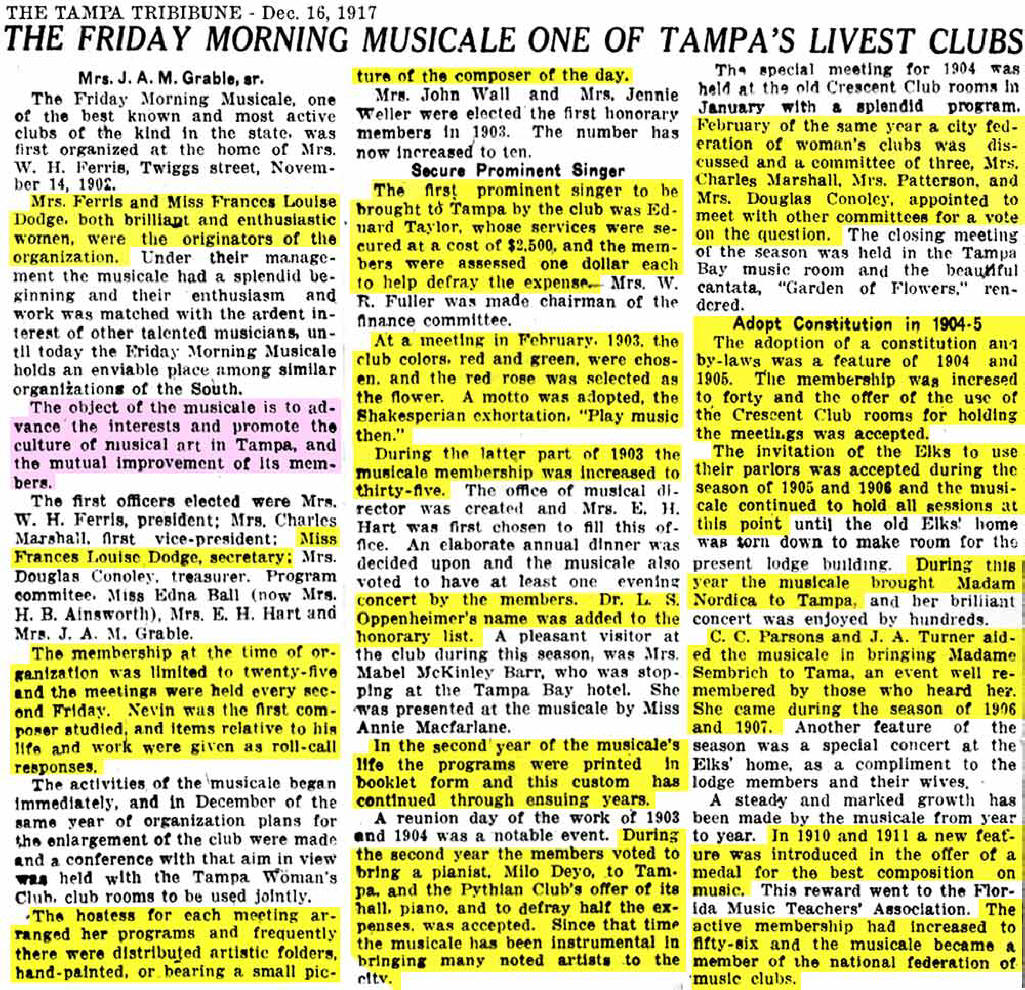
"Romany
pianist" Milo Deyo was a no-show.
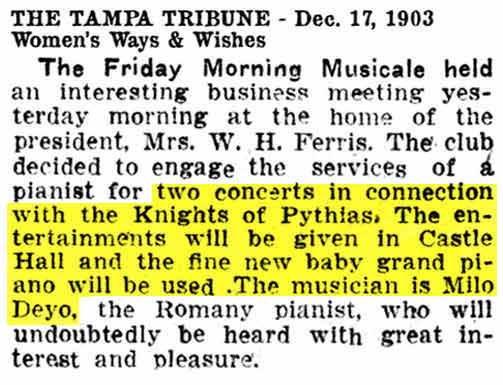
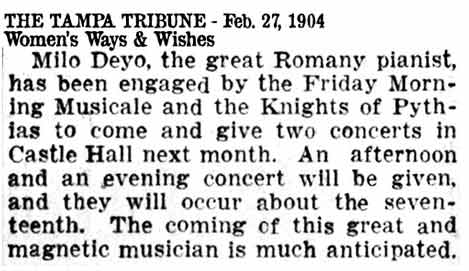
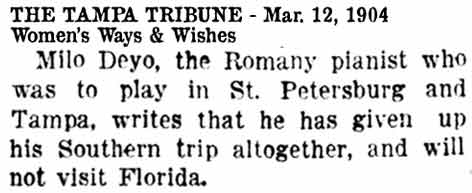
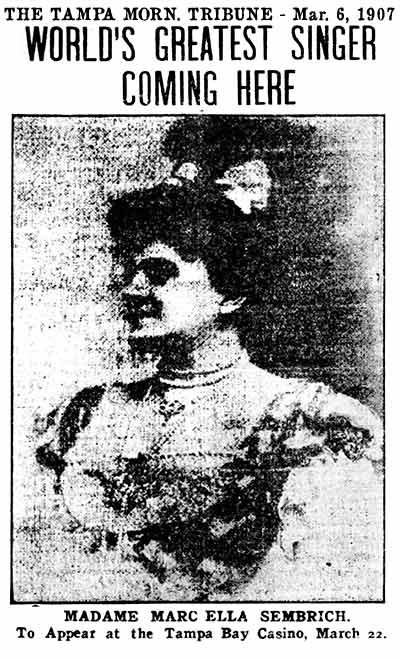
In 1907, only five years after the
club’s founding, members of the
Musicale secured a contract with
Madame Marc Ella Sembrich
guaranteeing her $2,250 to perform a
concert on March 22 at the Tampa Bay
Casino. Since the total contract
amount would be derived from ticket
receipts, the Musicale assumed no
financial obligation. In
announcing that Madame Sembrich
would sing in Tampa, the Tampa
Morning Tribune captioned her
[section two] front-page picture
with the words, "World’s Greatest
Singer Coming Here." By securing an
opportunity for Tampans to hear
Madame Sembrich sing, the Musicale
clubwomen achieved an artistic coup.
Sembrich had performed in Paris,
London and New York, and there was a
worldwide demand for her appearance.
The Tribune noted that few great
singers would have responded so
graciously as Madame Sembrich since
in Tampa there was "no stepping
stone to higher fame, nor any
original jury to write a world
verdict of approval." The Tribune
also paid tribute to the women of
the Musicale by thanking them for a
"great musical treat.” (Sunland
Tribune, Vol. 14, Nov. 1988 "Tampa's
Women's Clubs 1900-1930 by
Maryclaire Crake.) |
| |
|
FRIDAY MORNING MUSICALE
TWENTY FIVE
YEARS LATER
On the club's 25th anniversary, their meeting was held
at a new women's club house which included a 450
seat performance hall. |
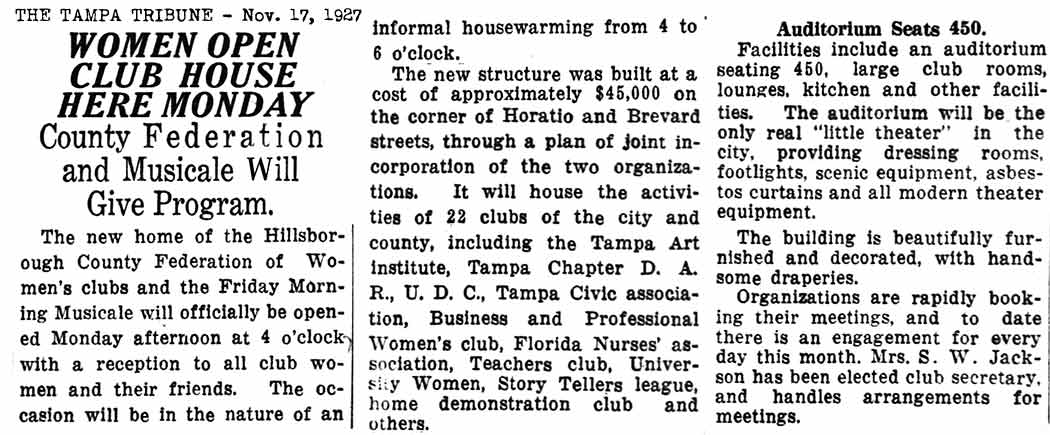
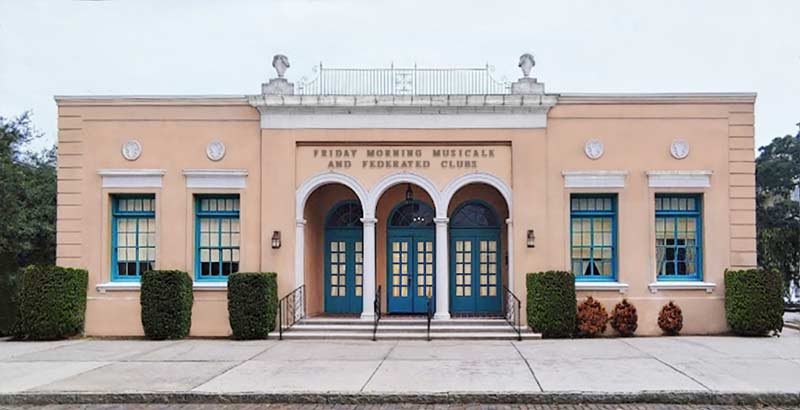
|
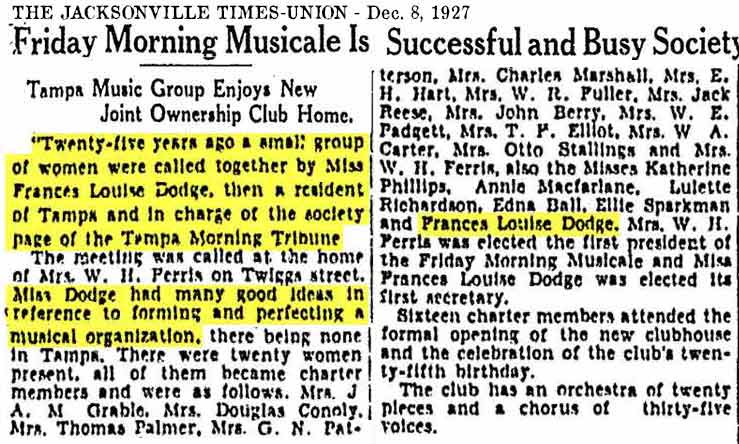
|
In 1927 the Hillsborough County Federation of
Women's Clubs financed and built an
Italian style club house at Horatio and
Brevard streets in Hyde
Park. The new facility featured a
theater which sat 450 people.
The article gives credit to Louise Dodge
for initiating the formation of the
Friday Morning Musicale.
Sixteen of the
twenty founding members were present. |
|
|
|
WHO WERE MR. & MRS. W. H. FERRIS?
Mrs. W. H. Ferris
appears in news articles hundreds of
times, almost daily from 1900 to about
1920 due to her musical talent, church, and
social events. She is always "Mrs.
W. H. Ferris" except for two mentions as
"Mrs. William H. Ferris." Her
husband, W. H. (William Houston) Ferris
is mentioned personally a handful of
times in the late 1890s to 1902, except
for his shoe store ads which appear
almost daily. After 1902, he
vanishes from the news. Mr. & Mrs. Ferris
are never mentioned together.
Find out who these people were and what
happened to them. Mr. Ferris was a
nephew of a Tampa mayor and grandson of
a Ft. Brooke pioneer merchant.
Mrs. Ferris was a niece of a Tampa judge
and his wife. Also see photos from the Friday Morning
Musicale's fifty year anniversary celebrations--all
here at TampaPix.
|
GRISMER CLAIMS LOUISE DODGE
STARTED THE CARNEGIE LIBRARY MOVEMENT
A History of the City of Tampa" etc, by
Karl Grismer, 1950 at University of
South Florida Digital Commons
Grismer claims Miss Dodge started the
library movement "about 1905."
Not so, Louise was
no longer the society page columnist at
this time and was on her way out of Tampa.
Instead, articles in 1901 and 1902 credit the
Tampa Women's Club, of which Louise was
a member, but Louise gives credit to the
president of the club, Mrs. Dick, and Mrs. Sumter
Lowry, wife of the city commissioner.
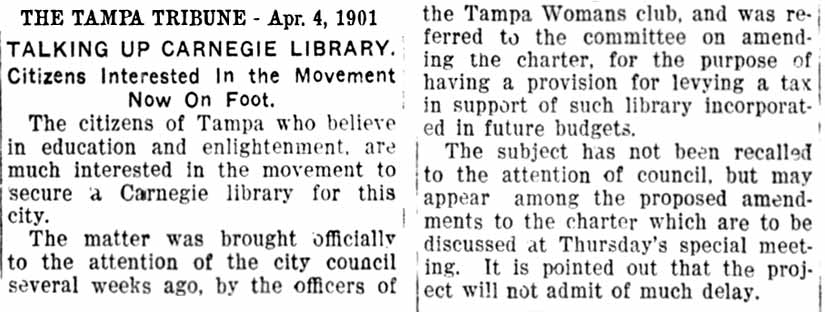 Grismer: Of
all the things which Tampa built during
the busy 1910s, probably nothing pleased
more people than the city’s first public
library. The
library drive was launched about 1905 by
Miss Louise Frances Dodge, society
editor of the Tampa Tribune, who
insisted that Tampa should endeavor to
secure a grant from the Carnegie
Foundation. She interested the Women’s
Club but strangely enough, strenuous
opposition developed. Grismer: Of
all the things which Tampa built during
the busy 1910s, probably nothing pleased
more people than the city’s first public
library. The
library drive was launched about 1905 by
Miss Louise Frances Dodge, society
editor of the Tampa Tribune, who
insisted that Tampa should endeavor to
secure a grant from the Carnegie
Foundation. She interested the Women’s
Club but strangely enough, strenuous
opposition developed.

Grismer was correct about the
opposition to the Carnegie grant.
TAMPA
TOOK 14 YEARS TO QUIBBLE ABOUT
ACCEPTING, AGREEING ON A SITE, AND
FINALLY BUILDING THE LIBRARY
By Grismer:
Many persons insisted that Tampa
should never stoop to accepting Andrew
Carnegie’s “tainted money” and they
fought the movement incessantly.
Finally, however, a $25,000. Carnegie
grant was secured in 1912 through the
able assistance of Hugh C. Macfarlane,
and a year later the grant was increased to $50,000. At the
same time, Macfarlane got a grant for a
library in West Tampa. After
the $50,000 City of Tampa grant was
pledged, a long fight developed over the
location of the proposed library.
Some said it should be built on the
Tampa Bay Hotel grounds, which the city
owned, and others held out for a
downtown location. After heated
arguments, a site on Seventh ‘Avenue
near Franklin was purchased for $15,000
and the building was constructed by Aulick, Bates &
Hudnall. The architect was Fred James.
The library was completed June 30, 1915,
but its opening was long delayed by the
refusal of the city council to
appropriate sufficient money
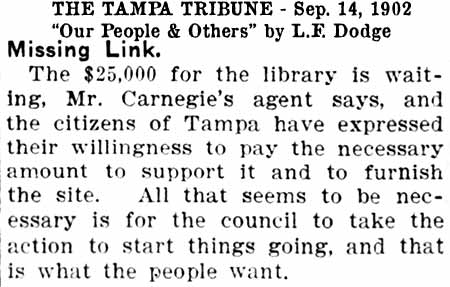 to
furnish and maintain it. The most the
council would agree to give was $5,000 a
year; the library board insisted $15,000
was needed. Finally, after endless
wrangling, the city council agreed to
give $10,000 and the library was opened
to the public Friday, April 27, 1917.
Its only books then were 8,800 which had
been donated by Mr. and Mrs. L. H.
Lothridge. Members of the first library
board were J. A. M. Grable, E. D.
Lambright, Henry Giddens, E. L. Robinson
and W. L. Parker. Miss Helen Virginia
Stelle was the first librarian and Miss
May Lewis, assistant librarian. Included
among the women who assisted in the
library movement were Mrs. J. C. McKay,
Mrs. U. S. Bird, Mrs. W. L. Ligat, Miss
Lottie Watkins, Mrs. W. C. Richards,
Mrs. C. W. Greene Mrs. M. M. Taylor and
Mrs. S. L. Lowry. to
furnish and maintain it. The most the
council would agree to give was $5,000 a
year; the library board insisted $15,000
was needed. Finally, after endless
wrangling, the city council agreed to
give $10,000 and the library was opened
to the public Friday, April 27, 1917.
Its only books then were 8,800 which had
been donated by Mr. and Mrs. L. H.
Lothridge. Members of the first library
board were J. A. M. Grable, E. D.
Lambright, Henry Giddens, E. L. Robinson
and W. L. Parker. Miss Helen Virginia
Stelle was the first librarian and Miss
May Lewis, assistant librarian. Included
among the women who assisted in the
library movement were Mrs. J. C. McKay,
Mrs. U. S. Bird, Mrs. W. L. Ligat, Miss
Lottie Watkins, Mrs. W. C. Richards,
Mrs. C. W. Greene Mrs. M. M. Taylor and
Mrs. S. L. Lowry.
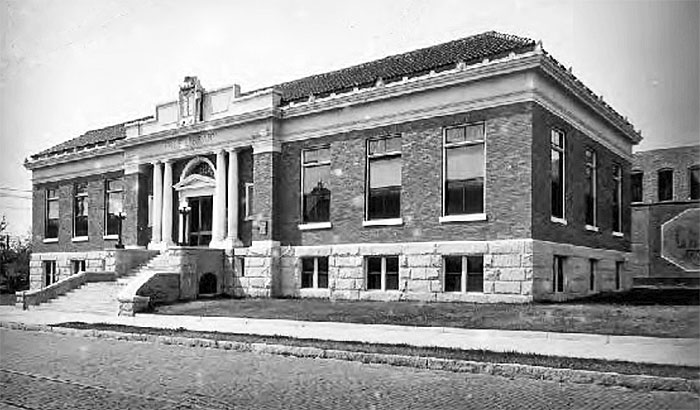
Tampa's Carnegie Library at 107 7th
Avenue, April 18, 1919
Photo courtesy of the Tampa-Hillsborough
Co. Public Library System, Burgert Bros.
collection.
See interior photos by Robertson & Fresh
| In 1968, the building
was converted into a center
for academically advanced
students, the "Exceptional
Children Education Center".
This program ended in 1986
when the city stopped busing
gifted students out of their
local schools. In 1987, the
city of Tampa sold the
building to the nonprofit
Tampa Bay Economic
Development Corporation for
$1. The corporation would do
the necessary renovations
and improvements after
finding someone to lease the
building and repay those
costs over time. In 1995,
the Tampa Free Library once
again garnered notice after
the roof had to be patched
to stop an influx of water
from destroying the
interior. It was at this
time that Tampa's
Architectural Review
Commission unanimously voted
to recommend the building
for local landmark
designation. In 1998, the
United Way of Hillsborough
County considered making the
Tampa Free Library building
its new headquarters, but
reconsidered due to the
price tag of renovating the
then 83-year-old-building.
In 1999 the city agreed to
foot the 2.2 million dollar
renovation costs by entering
a 25-year lease agreement
with Tampa Bay Economic
Development Corporation, at
the end of which, the city
would purchase the building
back for the $1 they sold it
for in 1987. Beginning in
1999, three agencies would
share the newly renovated
space: The Division of
Neighborhood Improvement,
the Women & Minority
Business Enterprise Program,
and the Office of Human
Rights and Community
Services. In November
2016, the administrative
offices for the
Tampa-Hillsborough County
Public Library were
relocated to the Tampa Free
Library from the fourth
floor of the John. F.
Germany Library in downtown
Tampa. In May 2024, USF
approached the county about
repurposing the Tampa Free
Library into an art museum.
(History
from Wikipedia) |
IT TOOK
THE CITY OF WEST TAMPA ONE YEAR
In 1913 Carnegie offered to donate
$17,500 for construction of a library
building in the city of West Tampa.
Residents voted in a special election to
accept the donation and a yearly tax to
pay for the library's operating costs.
The vote was 352 to 1. The identity of
the lone dissenter isn't available but
critics of Carnegie said the
industrialist was more interested in
vanity monuments than in doing good
works. A tract of land on Howard
Avenue was bought for $6,000 from
Macfarlane Investment Co. in 1913 and
construction began on what today is the
oldest of Hillsborough's 25 operating
libraries. On New Year's Day 1914 a
grand celebration marked the opening of
the first library in Hillsborough
County.
Read about the WT Library at TampaPix.
|
|
|
1902-Nov. 2:
MISS DODGE PUBLISHES A REPORT ON HER VISITS TO THE
LOCAL SCHOOLS
By 1902 Louise's
"Womans Ways and Wishes" was taking up an entire
page and continuing on a 2nd page. She
covered news of many women's clubs meetings in
addition to that of the art club and
music club.
See her Sept. 28, 1902 column.
About
every six weeks Louise made a tour of the local
county schools in order to report to the public what
was being accomplished in them. These reports
were published in the society page section of the
Tribune.
Recall that Miss Dodge attended the Peabody-funded
normal school at the university at Nashville, TN,
which was primarily a school to educate students
pursuing a teaching career. Her mother, Helen
Mills Dodge, was also a community school teacher in
Franklin, Michigan before she married David A.
Dodge. Both of Louise's parents were
well-educated.
The
whole article reports on the following schools and
can be seen here.
|
•
Washington Street School |
•
Ybor City School |
|
•
Hyde Park School |
•
Sixth Avenue Grammar School |
|
•
Italian School |
•
Hillsborough County High School |
Below is the beginning of the article.
|
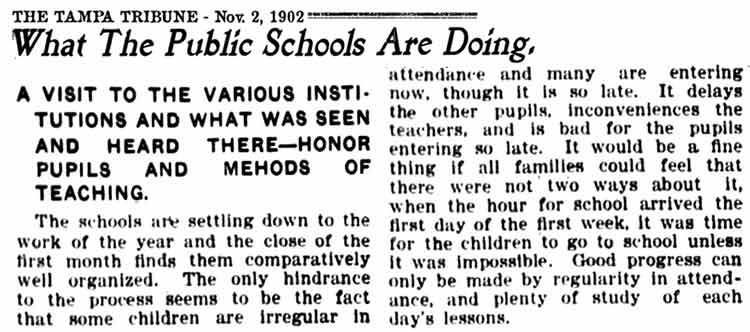
In late
July, 1903, Louise's feature got a new look, but the
title remained the same.
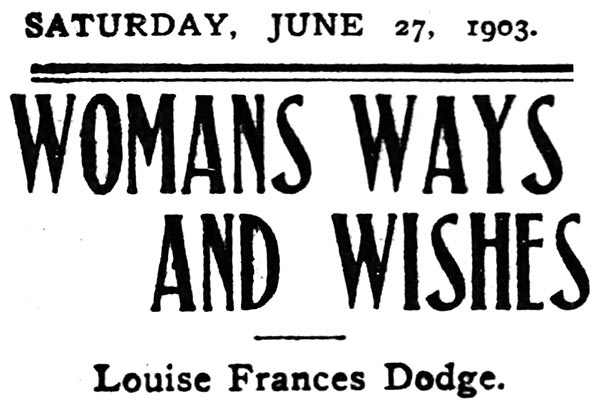
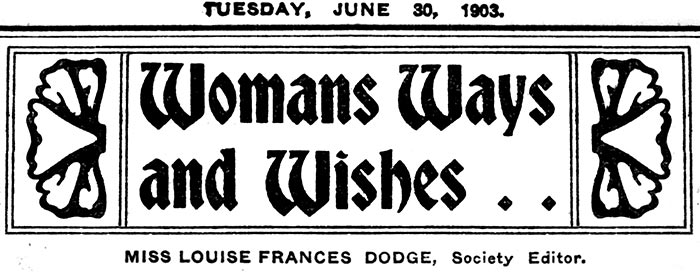
|
1903-Aug. 8: MISS
DODGE
FEATURED IN "THE SUNFLOWER"
On
August 8, 1903, a progressive women's newspaper in
New York published a lengthy article about Louise Dodge
and her achievements. This was a few months after
Tampa's first May Festival.
The
article mentions that Louise became interested in
the public welfare and wrote letters on the "upbuilding
of the state" which were published in a Florida
newspaper (the Bartow Courier-Informant.) In Tampa, "She widened her
duties...to take in the schools and public
institutions of Tampa. She founded a musical
club (The Morning Musicale) and an art club.
She herself was a singer of "fine gifts." She
visited the Tampa schools and reported items
concerning them that interested the public in their
progress and made tours of the schools about once
every six weeks. She organized Tampa's first
May Festival to raise funds for furnishing the
orphan's home and was able to donate several hundred
dollars for this cause."

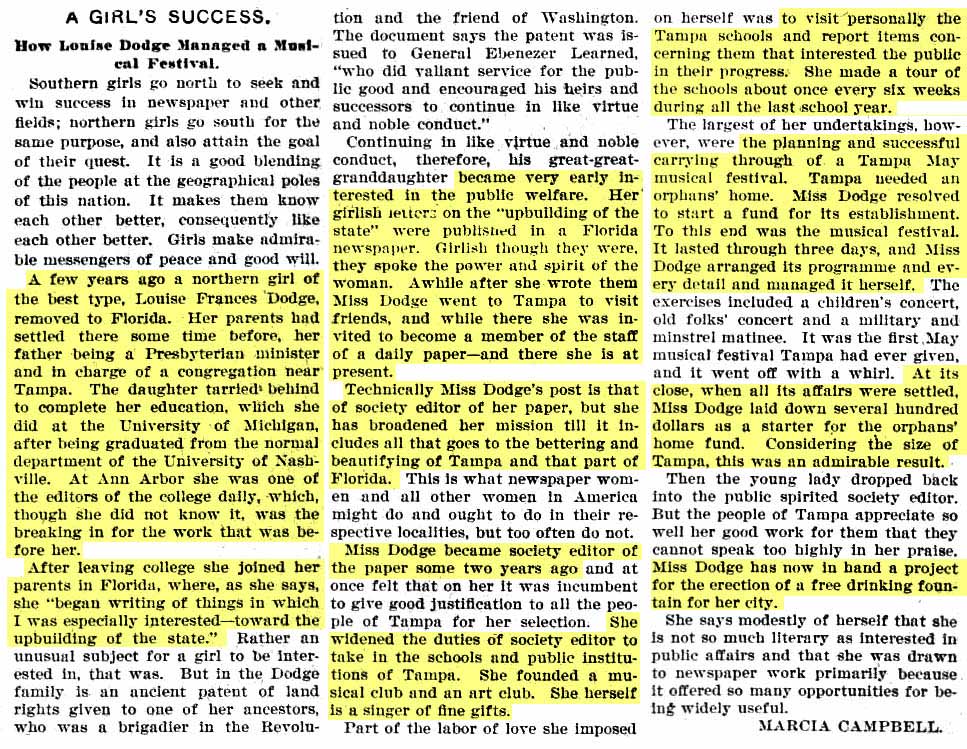
|
|
|
1904 - May 18:
MISS DODGE IS HONORED FOR HER FESTIVAL SUCCESS
On
May 13th, 1904, the ladies who helped with Tampa's second May
Festival gave a reception at the Tampa Bay Hotel parlors to
honor Miss Dodge. The treasurer of the
festival gave a speech praising her, then presented her with "a
handsome gold-mounted purse" containing $100 in gold.*
Miss Dodge left for St. Louis later that night to attend the
convention of the National Federation of Women's Clubs as a
delegate from Tampa's Club of Current Events, and to attend the
St. Louis World's Fair.
*The average price of gold in 1904 was $18.96 per ounce, so the gold award would have been about 5.27 ounces of gold.
At the time of the writing of this feature (July 16, 2024) gold
was $2,477 per ounce; Louise's gold would be worth $13,064
today.
|

|
MISS DODGE REPORTS FROM THE 1904 ST. LOUIS WORLD'S FAIR

Read the whole article.
NO
REPORT FROM MISS DODGE ABOUT THE NFWC convention
No
report of the meeting of the National Federation of
Women's Clubs was received from Miss Dodge,
but the article below indicates that the
president of Bryn Mawer [sic] College made a speech
concerning a recent report by "that rather
bigoted Englishman, a member of the Mosely
Educational Commission..."
that criticized the U.S. for employing women as
school teachers of girls and boys.
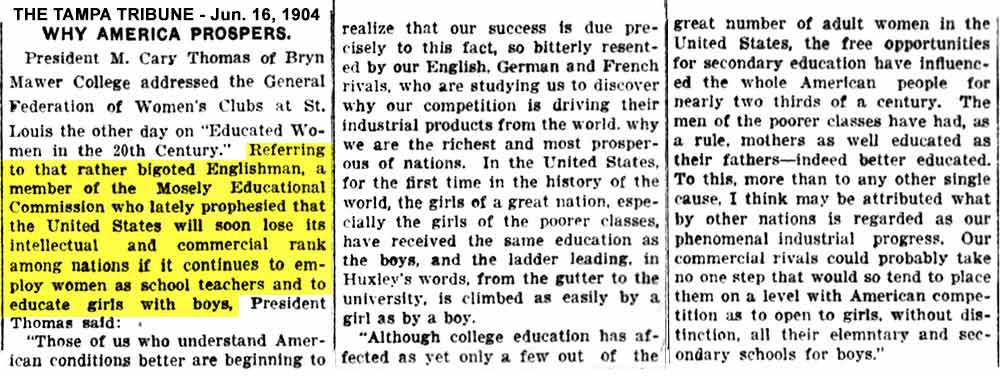
 That
"bigoted Englishman" was Prof. Henry E. Armstrong
(1848–1937), a controversial and energetic
publicist for reforms in teaching and curricula and
member of the Mosely Commission. That
"bigoted Englishman" was Prof. Henry E. Armstrong
(1848–1937), a controversial and energetic
publicist for reforms in teaching and curricula and
member of the Mosely Commission.
An
article in the Apr. 24, 1904 Boston Post published
the results of their polling the opinions of several
Boston educators of Armstrong's report regarding
women educators.
At
right: the beginning of that article.
Below,
the portion of this article which quotes Prof.
Armstrong.
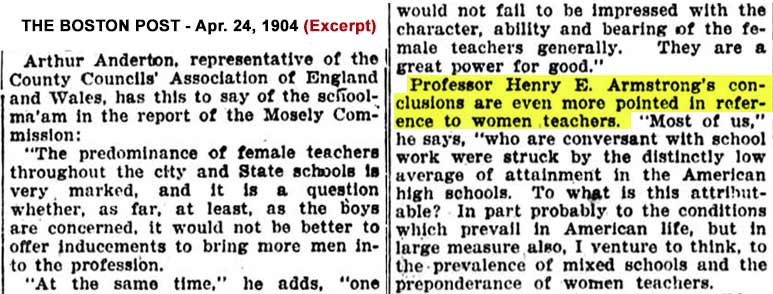
READ THIS WHOLE ARTICLE
The games of the 3rd
Olympiad were held in St. Louis in the summer of
1904. Chicago initially won the bid to host
the 1904 Summer Olympics, but the organizers of the
Louisiana Purchase Exposition in St. Louis would not
accept another international event in the same
timeframe. The exposition organization began to plan
for its own sports activities, informing the Chicago
OCOG that its own international sports events
intended to eclipse the Olympic Games unless they
were moved to St. Louis. Pierre de Coubertin,
founder of the modern Olympic movement, then
intervened and awarded the Games to St. Louis.
(Info from Wikipedia.)
1904-June:
LOUISE DODGE CHOSEN AS SECRETARY AND ASST. MANAGER OF THE SOUTH
FLORIDA FAIR ASSOCIATION
Miss Dodge is credited for the success of the 1904 May Festival.
The Tribune thinks Jai-Alai is a Cuban game; only the name is
Cuban,
having originated as "pelota
vasca" in the Basque region of Europe along the
border of Spain and France bordering the Bay of Biscay.
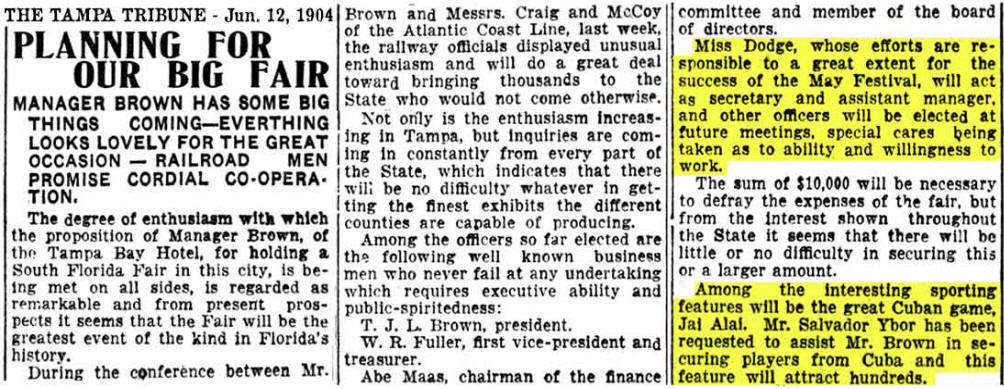
|
|
1904-SEP. 8:
LOUISE DODGE QUITS THE TRIBUNE TO TEACH AT TAMPA PREPARATORY
SCHOOL
Neither the Tribune
or Louise Dodge informed their readers of her departure.
Instead, an article was published in an announcement by the head
of Tampa Preparatory School stating Miss Dodge was on the
faculty. Two days later, the Tribune published two articles which appeared
in Bartow and Ocala newspapers.
|
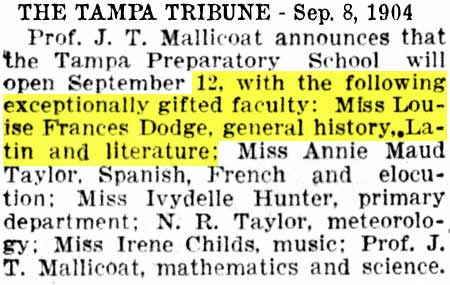 
Read her speech to the Tampa Prep pupils on opening day.
|
MISS DODGE APPEARS IN THE BILLBOARD NEWS
The article in "The Billboard" issue of Sept. 17, 1904 reported
that Louise was elected secretary of the South Florida Fair
Association by popular vote. Back then, "South Florida"
was the entire peninsula portion of the state. North
Florida was the panhandle. It also stated that Miss Dodge was the
originator of an art club and a music club, as well as the 1903
and 1904 May festivals. The photo could be the only
existing photo of her.
|
|
Louise
joined the Jacksonville Times-Union as their Tampa
correspondent in late January 1905. The
article claims that this position would not
interfere with her teaching at Tampa Prep. School.
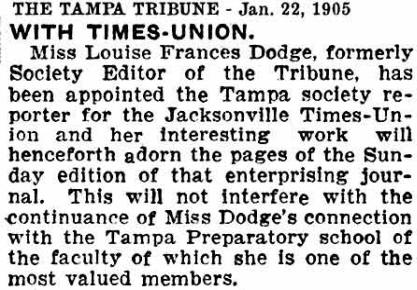 |
On Mar.
5, 1905 the Trib announced that Louise had resigned
from Tampa Preparatory School and was leaving for
"her home in Winter Haven" then leaving with
her parents to California. This indicates
that she wasn't living in Tampa and probably never
did, as no Tribune article ever mentioned a home in
Tampa, but coming frequently for various meetings
and social events. Her features were probably
sent to Tampa by mail.
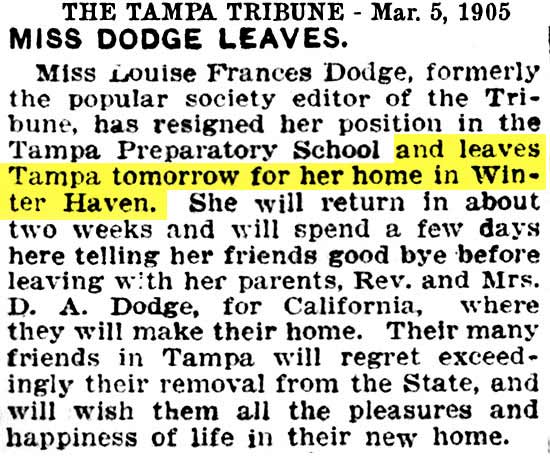 |
|
HELEN
STEWART REPLACES DODGE
The new
society page reporter takes the opportunity to do
what Louise Dodge never did--give credit to the
Friday Morning Musicale's originator, Louise Francis
[sic] Dodge |
 |
|
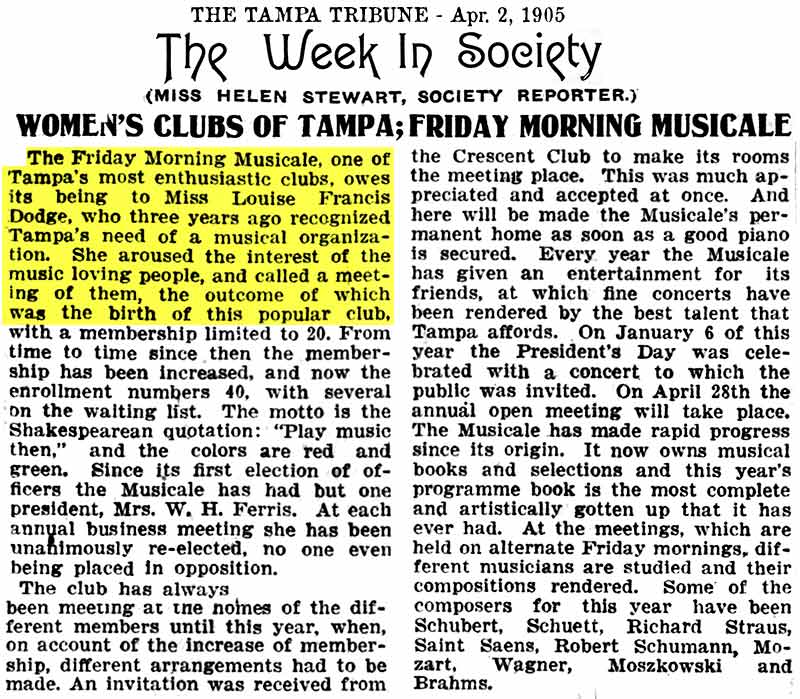
. |
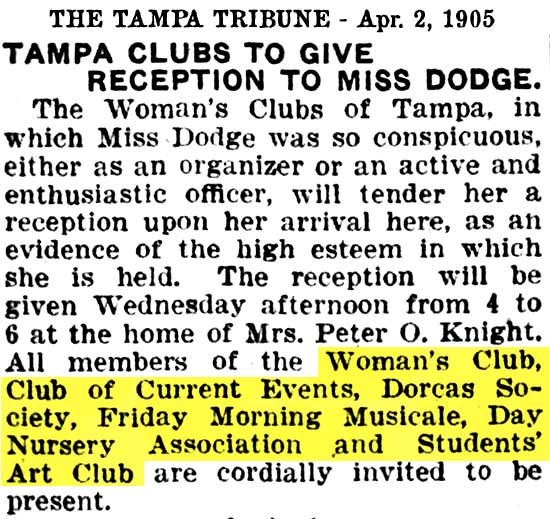 1905 - Apr. 4: MISS DODGE GIVEN
TRIBUTE OF APPRECIATION AND FAREWELL 1905 - Apr. 4: MISS DODGE GIVEN
TRIBUTE OF APPRECIATION AND FAREWELL
"No woman in Tampa has ever received such a compliment and
certainly no woman has ever deserved such a one more than Miss
Dodge." The reception was held at the home of Mr. & Mrs.
Peter O. Knight. In line with Miss Dodge stood the
presidents of six women's clubs. The Friday Morning
Musicale, the Women's Club, the Club of Current Events, the Day
Nursery Association, the Dorcas Society, and the Students' Art
Club. A gold watch engraved with the names of the six
clubs was presented to Miss Dodge.
"The watch bears in
engraved letters the names of the clubs..." |
Remember the
description of the gold watch; you will hear about it later.
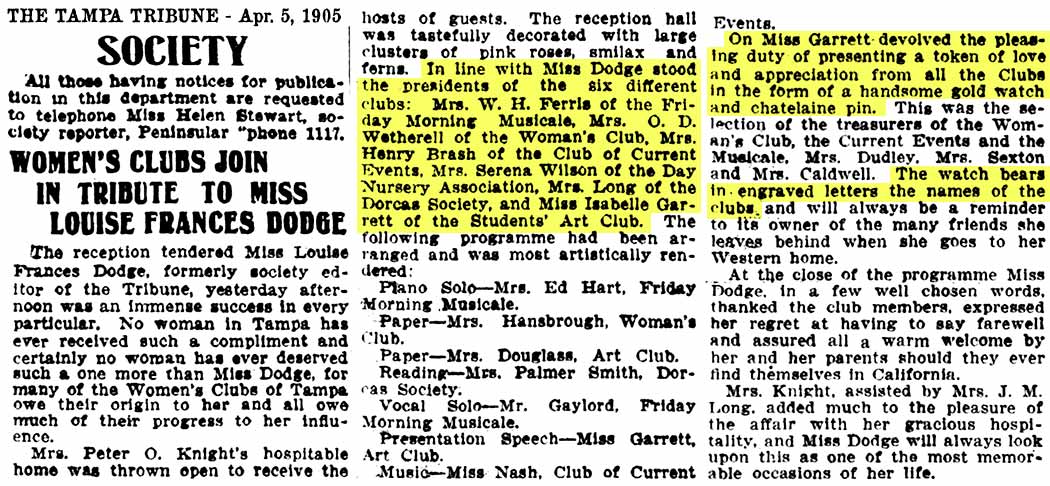
|
|
|
|
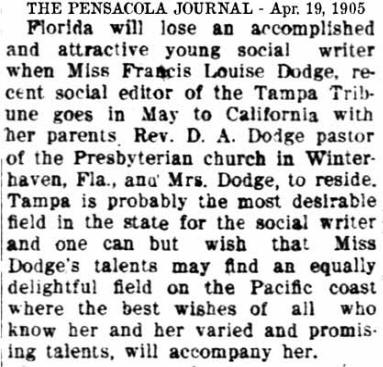 |
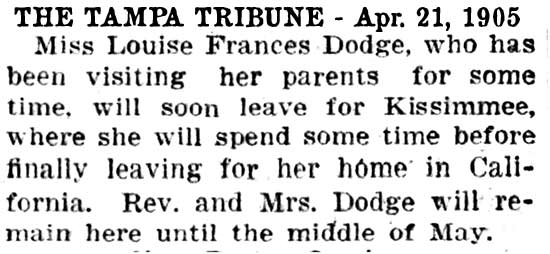 |
LOUISE IN JACKSONVILLE, EN ROUTE TO NEW
YORK
Louise left Tampa in mid-May for
Jacksonville, Atlanta, S. and N. Carolina,
Washington DC, then NYC where her parents
would join her. She would be joined
there by her parents in early June and visit
in New England states "where they have a
host of friends and relatives." The
trip to the Pacific coast would be made "in
easy stages."

|
The
Dodges' itinerary seems to have changed, Mr. & Mrs.
left for Washington DC instead of New York City.
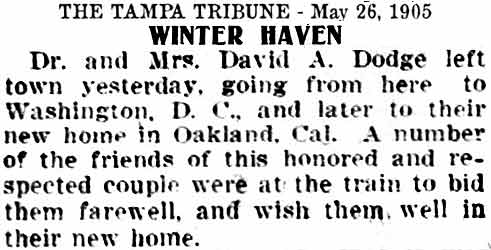

1905, Aug 1
LOUISE DODGE REPORTS FROM PORTLAND, OREGON |
1905, Nov. 12
LOUISE DODGE REPORTS FROM SAN FRANCISCO |
|
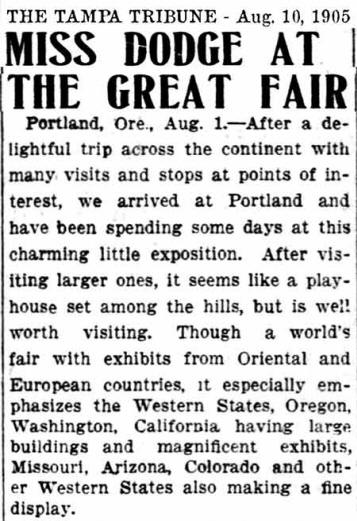
READ
THE WHOLE ARTICLE |
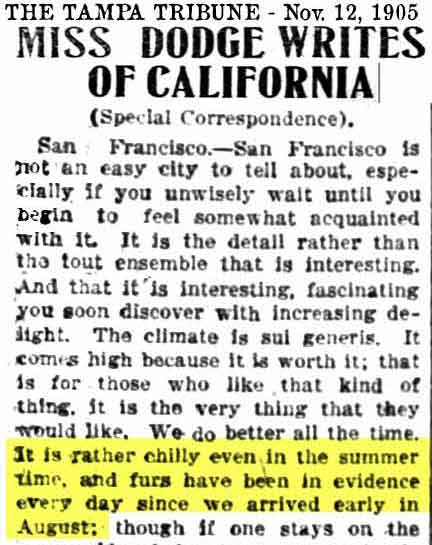
sui generis
READ THE WHOLE ARTICLE
Louise says they arrived in San Francisco in EARLY
AUGUST.
In her colorful, vivid description of her first
impressions of turn-of-the-century San Francisco,
Louise appears to be optimistically exuberant.
She mentions the arts, theater, transportation,
markets, shops, fruit, flowers, restaurants,
apartment houses, plant life (which she describes as
artificial, but not fake like we use the word,
instead she means "planted.") The people are "fine
and dandy" and "a little earthquake occasionally
reminds one that man is mortal here below, but it
does not worry one." |
|
|
Famous last words. |
| |
|
1906 - Mar. 4
The Tampa Tribune
"SONGS OF THE IRISH AT MUSICALE MEETING"
"At the close of the Friday Morning Musicale meeting
of Mar. 2, 1906, a letter was read by the club's
secretary, Mrs. G. N. Patterson, from Miss Louise
Dodge, telling of the work of the musical circles in
California."
[Article not necessary]
|
1906 - Apr. 11
The Tampa Tribune
"MEETING OF DAY NURSERY"
At the monthly meeting of the Day Nursery
Association on Apr. 10 at the Clementina Gil Nursery
in Ybor City, an appreciative letter from Louise
Dodge was read in which she wished the nursery
success and gave some suggestions at to the work.
[Article not necessary] |
| |
|
DISASTER STRIKES SAN FRANCISCO
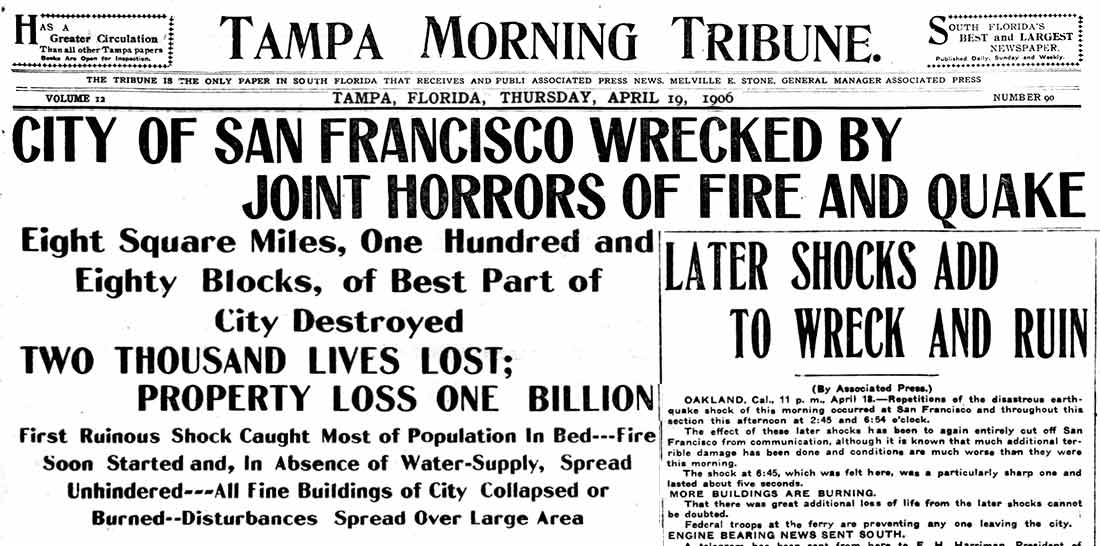
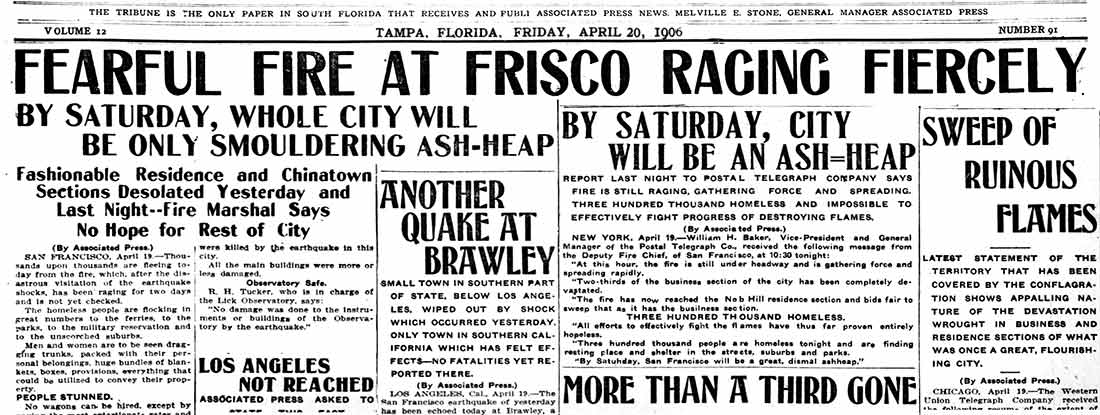
TO BE
CONTINUED ON NEXT PAGE - DID THE DODGES DODGE THE DISASTER?
Read about the tragic end for Louise Frances Dodge.
NEXT PAGE
|







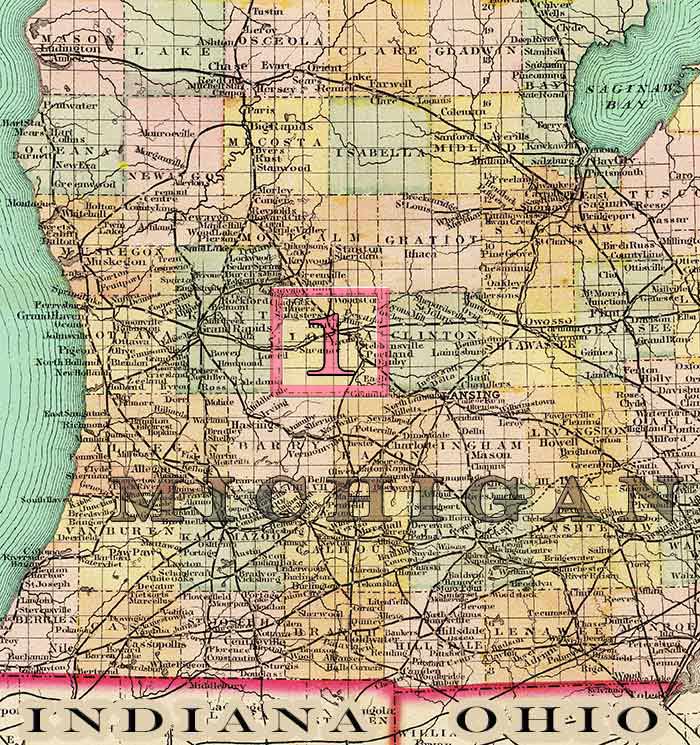
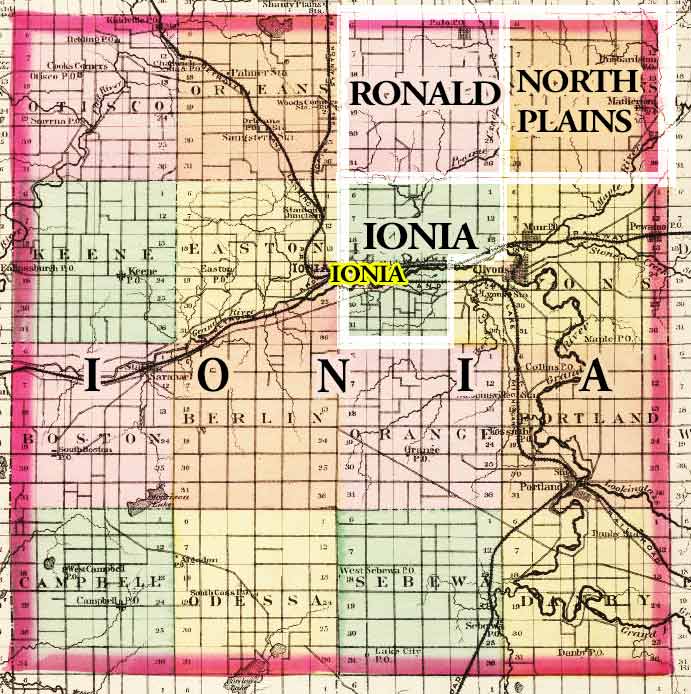









 DAVID
A. DODGE JOINS IN LAW PARTNERSHIP,
DAVID
A. DODGE JOINS IN LAW PARTNERSHIP, 





 In
April 1880 Mrs. Dodge visited Waterloo. The Courier
reported that she had already left two days earlier
for the East where Mr.
Dodge had his headquarters in Harrisburg, PA.
This was probably the
Greenback party headquarters who held their
Pennsylvania state convention in Harrisburg in late
March, 1880. The party held a national
convention in Chicago in June of that year.
In
April 1880 Mrs. Dodge visited Waterloo. The Courier
reported that she had already left two days earlier
for the East where Mr.
Dodge had his headquarters in Harrisburg, PA.
This was probably the
Greenback party headquarters who held their
Pennsylvania state convention in Harrisburg in late
March, 1880. The party held a national
convention in Chicago in June of that year.










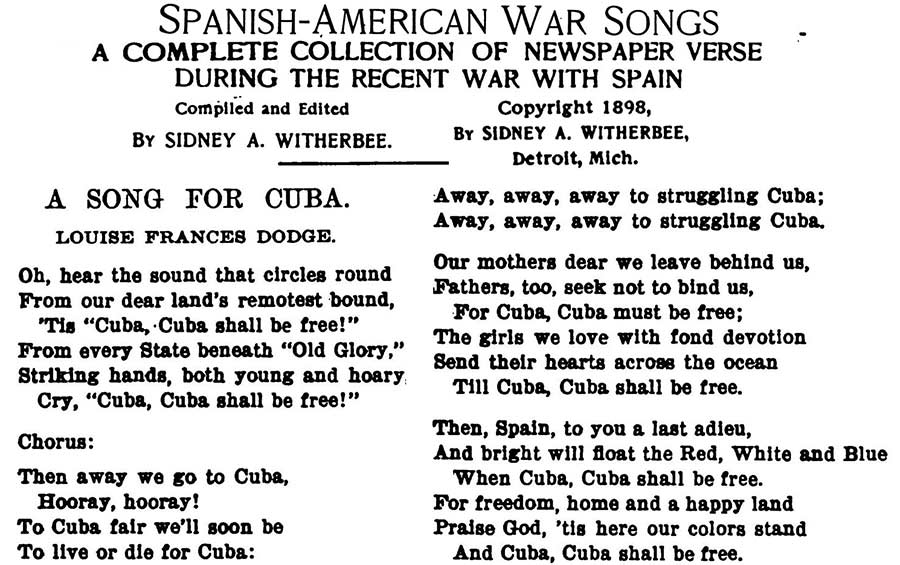

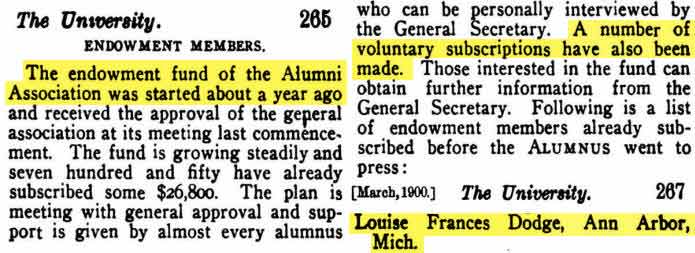
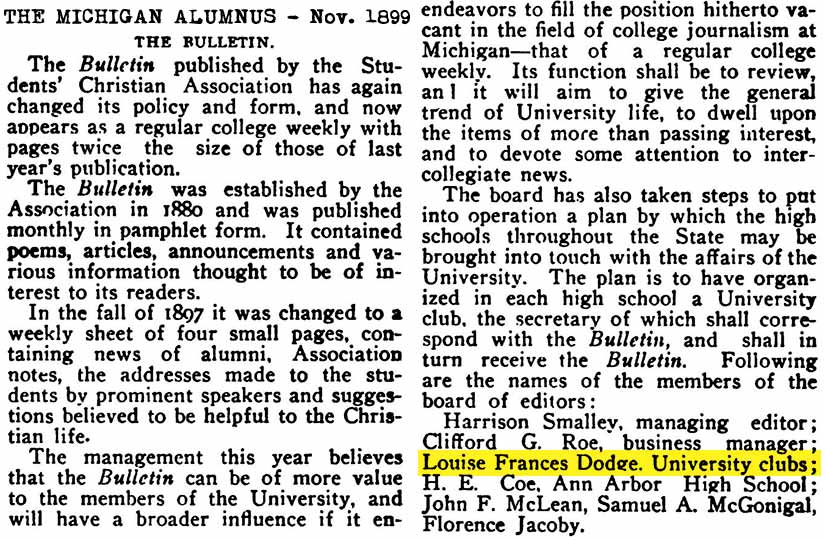

















 FIRST
MEETING OF THE STUDENTS ART CLUB
FIRST
MEETING OF THE STUDENTS ART CLUB
 On Sep. 11, 1902, the Students' Art Club
met at home of Mrs. Deakyne. The club
president told of the "young artist
Barnard" having recently been
commissioned with a $350,000 contract.
She contrasted the amount with how much
Barnard lived on while he was studying
in Paris--"$350 for three years."
The
On Sep. 11, 1902, the Students' Art Club
met at home of Mrs. Deakyne. The club
president told of the "young artist
Barnard" having recently been
commissioned with a $350,000 contract.
She contrasted the amount with how much
Barnard lived on while he was studying
in Paris--"$350 for three years."
The


















 Grismer: Of
all the things which Tampa built during
the busy 1910s, probably nothing pleased
more people than the city’s first public
library. The
library drive was launched about 1905 by
Miss Louise Frances Dodge, society
editor of the Tampa Tribune, who
insisted that Tampa should endeavor to
secure a grant from the Carnegie
Foundation. She interested the Women’s
Club but strangely enough, strenuous
opposition developed.
Grismer: Of
all the things which Tampa built during
the busy 1910s, probably nothing pleased
more people than the city’s first public
library. The
library drive was launched about 1905 by
Miss Louise Frances Dodge, society
editor of the Tampa Tribune, who
insisted that Tampa should endeavor to
secure a grant from the Carnegie
Foundation. She interested the Women’s
Club but strangely enough, strenuous
opposition developed. 
 to
furnish and maintain it. The most the
council would agree to give was $5,000 a
year; the library board insisted $15,000
was needed. Finally, after endless
wrangling, the city council agreed to
give $10,000 and the library was opened
to the public Friday, April 27, 1917.
Its only books then were 8,800 which had
been donated by Mr. and Mrs. L. H.
Lothridge. Members of the first library
board were J. A. M. Grable, E. D.
Lambright, Henry Giddens, E. L. Robinson
and W. L. Parker. Miss Helen Virginia
Stelle was the first librarian and Miss
May Lewis, assistant librarian. Included
among the women who assisted in the
library movement were Mrs. J. C. McKay,
Mrs. U. S. Bird, Mrs. W. L. Ligat, Miss
Lottie Watkins, Mrs. W. C. Richards,
Mrs. C. W. Greene Mrs. M. M. Taylor and
Mrs. S. L. Lowry.
to
furnish and maintain it. The most the
council would agree to give was $5,000 a
year; the library board insisted $15,000
was needed. Finally, after endless
wrangling, the city council agreed to
give $10,000 and the library was opened
to the public Friday, April 27, 1917.
Its only books then were 8,800 which had
been donated by Mr. and Mrs. L. H.
Lothridge. Members of the first library
board were J. A. M. Grable, E. D.
Lambright, Henry Giddens, E. L. Robinson
and W. L. Parker. Miss Helen Virginia
Stelle was the first librarian and Miss
May Lewis, assistant librarian. Included
among the women who assisted in the
library movement were Mrs. J. C. McKay,
Mrs. U. S. Bird, Mrs. W. L. Ligat, Miss
Lottie Watkins, Mrs. W. C. Richards,
Mrs. C. W. Greene Mrs. M. M. Taylor and
Mrs. S. L. Lowry.








 That
"bigoted Englishman" was Prof. Henry E. Armstrong
(1848–1937), a controversial and energetic
publicist for reforms in teaching and curricula and
member of the Mosely Commission.
That
"bigoted Englishman" was Prof. Henry E. Armstrong
(1848–1937), a controversial and energetic
publicist for reforms in teaching and curricula and
member of the Mosely Commission.



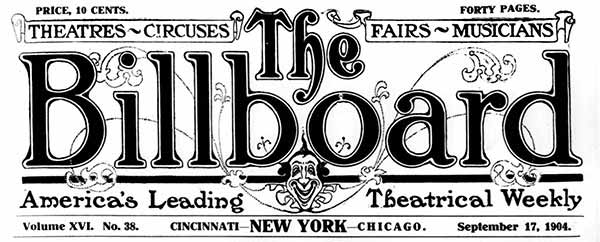
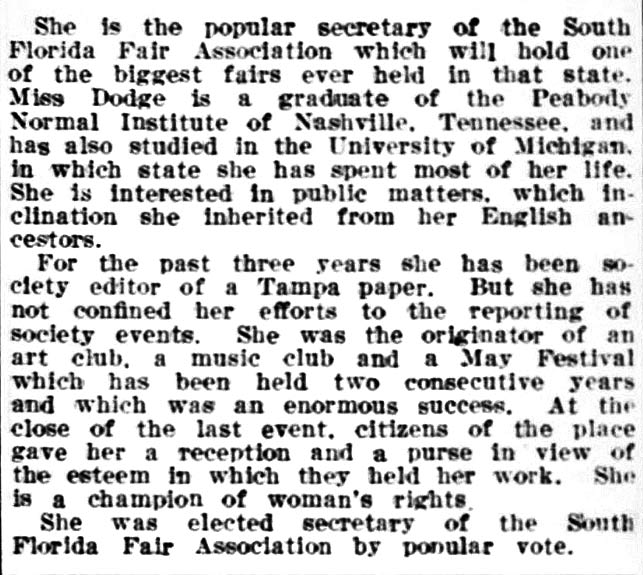
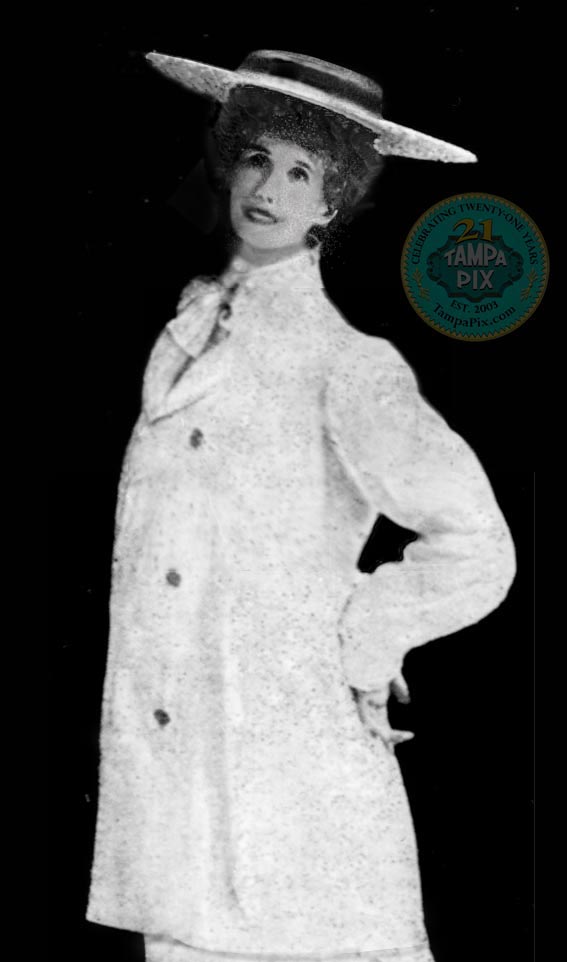




 1905 - Apr. 4: MISS DODGE GIVEN
TRIBUTE OF APPRECIATION AND FAREWELL
1905 - Apr. 4: MISS DODGE GIVEN
TRIBUTE OF APPRECIATION AND FAREWELL









